new posts in all blogs
Viewing Blog: Fresh Eyes: A Bookseller's Journal, Most Recent at Top
Results 26 - 50 of 316

Envisioning New Bridges Between Authors & Readers
Statistics for Fresh Eyes: A Bookseller's Journal
Number of Readers that added this blog to their MyJacketFlap: 2
Earlier this week, the University of California, Davis, revealed that it had been partnering with Amazon since last fall on a pilot program through which the online retailer pays the school 2% of net purchases made by UC Davis Amazon Student members, or by users who enter Amazon through a storefront on the home page of the university's store.
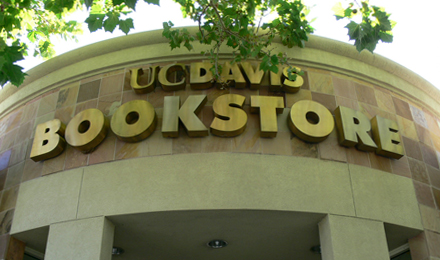 "Whether deals like this harm UC Davis Stores sales is an open question and, now, an ongoing experiment," a Forbes article headlined "Amazon Attacking Barnes & Noble On Campus?" noted. "Less immediately clear is if such a deal will put a dent in one of Barnes & Noble's healthiest businesses. In 2013, the college bookstore segment showed modest 1.1% growth while both the company's other divisions shrank."
"Whether deals like this harm UC Davis Stores sales is an open question and, now, an ongoing experiment," a Forbes article headlined "Amazon Attacking Barnes & Noble On Campus?" noted. "Less immediately clear is if such a deal will put a dent in one of Barnes & Noble's healthiest businesses. In 2013, the college bookstore segment showed modest 1.1% growth while both the company's other divisions shrank."
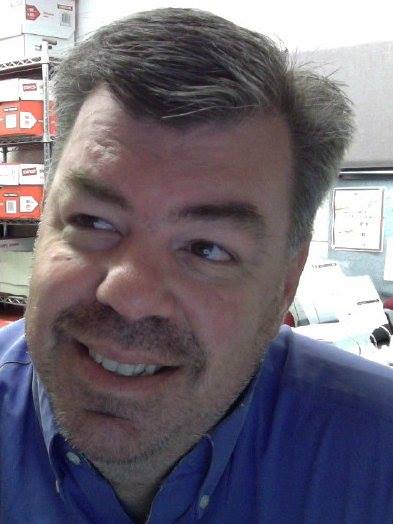 |
| Goodman |
Concerns over B&N's fiscal health aside, the future of independent college bookstores also comes into play here. A link to the Forbes piece was sent to me by Drew Goodman, former trade book sales manager at the University of Utah Campus Store and currently a speaker, consultant and writer at Building Better Ideas. He described the UC Davis/Amazon deal as "a proverbial shot across the bow of independent college stores."
I asked him to expand a bit on his initial reaction. Goodman said he has no doubts that Amazon's incursion into the college bookstore market is a negative development. He recalled that he lost his bookselling job last April "in part due to the online competition from retail sites, particularly Amazon. I think there are those in the college store industry who continue to innovate and resist giving in to Amazon. They are trying their best to create new ways of serving the students, staff and faculties at their schools that Amazon just can't do without a physical presence. They are going to see Amazon/UC Davis partnership as a deal with the devil.
"Other stores, such as the one I worked for, started giving in. We set up associate seller accounts to try and redirect students to purchase from Amazon, but through the bookstore links. As long as we got the sales percentage from Amazon, we felt that it was better than nothing. Problem is, what you end up training your students to do is just go to Amazon in the first place."
The UC Davis/Amazon partnership, however, "is a whole new animal, and could really end up being a case of the rabbit tugging on the bear's tail," Goodman observed. "It may look good initially, but again, you're just giving away your sales for a 2% take."
He also cited a prior situation that occurred when he worked for Borders Books, which partnered with Amazon in 2001 to run its website and took a percentage cut of sales: "The problem was, it began to funnel too many sales to Amazon. Why go to Borders.com when you could just go to Amazon in the first place? By the time Borders had their 'Oh, sh*t' moment about the whole thing, it was too late. They never recovered enough to really put together a competitive website. They had trained their own customers to go to Amazon--end of story."
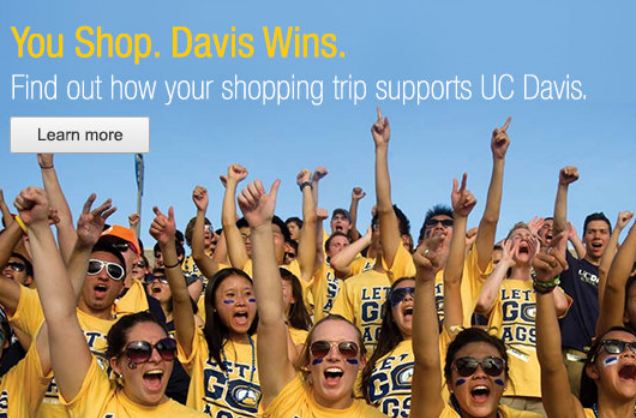 A primary concern for Goodman is that "in taking the leap on this deal," UC Davis could set a precedent, particularly for bookstores that "have gotten lazy about competing, relying on the students needing to come to them for their books and supplies, and not doing anything to push back against sales being taken by Amazon. Those stores who are already in precarious positions may just throw up their hands and give in to Amazon. Others may be pulled in by the siren song that Amazon is singing, only to find their physical stores drifting too close to and crashing on the rocks.
A primary concern for Goodman is that "in taking the leap on this deal," UC Davis could set a precedent, particularly for bookstores that "have gotten lazy about competing, relying on the students needing to come to them for their books and supplies, and not doing anything to push back against sales being taken by Amazon. Those stores who are already in precarious positions may just throw up their hands and give in to Amazon. Others may be pulled in by the siren song that Amazon is singing, only to find their physical stores drifting too close to and crashing on the rocks.
"Amazon never does anything unless it benefits Amazon," he added, noting that another article he read "had said that the reason UC Davis was partnering with Amazon was because they were one of the most successful college stores when it came to the associate program. That says to me they have already been handing a ton of their business over to Amazon. My suspicion is that Amazon wants this 'partnership' so that they can get a top to bottom, deep dive on the data for a college store, and once they have that data and no longer need a partner, they'll curb-stomp UC Davis, just like they've done so often to others."
Goodman also predicted that Amazon "will not stop with just one store, and by the time stores that are participating find out what kind of raw deal they may be getting it will be too late, leaving the entire college stores industry just that much weaker."
--Published by Shelf Awareness, issue #2177.
Sometimes the stars just mysteriously align in our book universe. There's no "mind the gap" caution for readers venturing between past and present; or the diverse worlds in books we read and the "real" world. One of these intriguing alignments occurred recently in my little corner of the universe with art and literature. Here are a few of the signs I noticed:
Excellent books (read or reading now) on my desk: Within reach, and all connected in some way to art, are The Eleven by Pierre Michon (translated by Jody Gladding & Elizabeth Deshays), The Fountain of St. James Court or, Portrait of the Artist as an Old Woman by Sena Jeter Naslund, Secrecy by Rupert Thomson (ARC, April release), The Artist's Library by Laura Damon-Moore & Erinn Batykefer (ARC, May) and The Goldfinch by Donna Tartt.
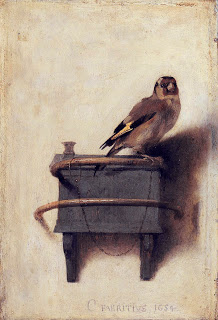 Cool bookstore road trip: Roxanne Coady, owner of R.J. Julia Booksellers, Madison, Conn., just hosted what looked like a great bus trip to the Frick Collection in New York City for the exhibition "Vermeer, Rembrandt, and Hals: Masterpieces of Dutch Painting from the Mauritshuis," featuring Goldfinch, a 17th-century painting by Carel Fabritius that plays a key role in Donna Tartt's novel.
Cool bookstore road trip: Roxanne Coady, owner of R.J. Julia Booksellers, Madison, Conn., just hosted what looked like a great bus trip to the Frick Collection in New York City for the exhibition "Vermeer, Rembrandt, and Hals: Masterpieces of Dutch Painting from the Mauritshuis," featuring Goldfinch, a 17th-century painting by Carel Fabritius that plays a key role in Donna Tartt's novel.
Art, literature & commerce: The influence of books on attendance at the Frick exhibition was phenomenal, driven initially by the presumed star of the show, Vermeer's Girl With a Pearl Earring, which had been expected to draw art lovers as well as fans of Tracy Chevalier's bestselling 2000 novel. Goldfinch, however, soon began "hogging the spotlight," Frick director Ian Wardropper told the New York Times. "Halfway through the exhibition, we noticed a shift.... That's when we started to see book clubs coming in." As of last week, Goldfinch tote bags had outsold their Pearl competition 842 to 582.
The power of fiction: I saw the Frick exhibition in December and was also pleasantly surprised by the crowds huddled around the small work by Fabritius compared to the clear sight lines available for the Vermeer. I was not prepared for a second surprise in store for me when I entered the Living Hall to pay my respects to a pair old friends: Hans Holbein's portraits of Thomas More and Thomas Cromwell, staring one another down grimly as they did centuries ago.
It had been a few years since my last Frick pilgrimage. On previous visits, I was always drawn to the More portrait, perhaps because Utopia is one of my favorite books and I love Peter Ackroyd's biography. Cromwell, by contrast, looked like that grouchy uncle at a family reunion. But last month, for the first time, Cromwell seemed to have altered dramatically; his expression was keen, his eyes radiating intelligence. I glanced over at More. He looked a bit... dyspeptic. There was no mystery; I knew immediately who was to blame for my confusion as well as the apparent touching up of these paintings after nearly 500 years. Hilary Mantel's Wolf Hall and Bring Up the Bodies had clearly disarmed my longstanding prejudice against Cromwell through the irresistible necromancy of fiction.
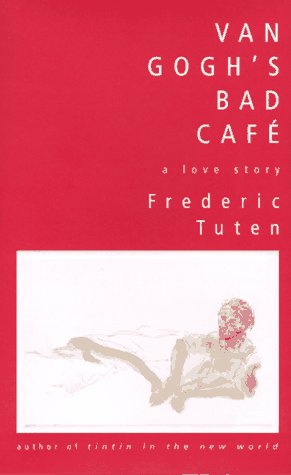 What remains of art & of books: In 1999, BookExpo was held in Los Angeles and we arrived a day early so we could see "Van Gogh's Van Goghs" at the L.A. County Museum of Art. I was the remainder buyer for the Northshire Bookstore then, and perhaps can lay blame on that extraordinary--once in a (my, at least) lifetime--exhibition for "inspiring" me to purchase, a few years later at CIROBE in Chicago, nearly 1,000 remaindered hardcover copies of Frederic Tuten's Van Gogh's Bad Café at a cool 25 cents each.
What remains of art & of books: In 1999, BookExpo was held in Los Angeles and we arrived a day early so we could see "Van Gogh's Van Goghs" at the L.A. County Museum of Art. I was the remainder buyer for the Northshire Bookstore then, and perhaps can lay blame on that extraordinary--once in a (my, at least) lifetime--exhibition for "inspiring" me to purchase, a few years later at CIROBE in Chicago, nearly 1,000 remaindered hardcover copies of Frederic Tuten's Van Gogh's Bad Café at a cool 25 cents each.
The good news is that we eventually sold more than 600 of them for a tidy profit before I left the Manchester, Vt., bookstore in 2006. The bad news is the remaining copies may still be buried in deep storage there, sealed away like a plot twist in an Edgar Allan Poe story. That novel is part of my bookseller's legacy, as Northshire general manager Chris Morrow jokingly (I hope) reminded me not long ago.
Centuries from now, when android archaeologists are combing through the ruins of an ancient indie bookshop, will they unearth those cartons and wonder what the hell their human forebears were thinking? One can only hope my single contribution to the art world--an installation I call "Van Gogh's Bad Café: The Boxed Remains"--will fascinate lovers of art and literature in the distant future.--Published by Shelf Awareness, issue #2172.
As you read this, the 14th annual Pulpwood Queens Girlfriend Weekend is officially underway in Jefferson, Tex., featuring a resplendent gathering of book lovers, authors and even an Elvis impersonator or three to evoke this year's theme, "Viva Las Vegas, Baby!"
Just yesterday, founder of the Pulpwood Queens Book Club--with more than 500 chapters nationwide--and long-reigning Queen of Girlfriend Weekend Kathy Murphy (formerly Kathy Patrick) shared her final checklist on Facebook: "Tiara packed, check, fifty million costumes plus headdresses, check! I am on my way to Jefferson in just a few minutes and am I pumped! We'll have more Elvises than you can shake a stick at and quite a few Ann-Margarets too! See you there, channeling Nancy Sinatra!"
If there is anyone in our industry who better represents the concept of "the show must go on" than Kathy, I'm not sure who that might be. This has been a year of transition for her, including the closure of Beauty and the Book bookshop/hair salon in Jefferson and a move to Hawkins, as well challenges in her personal life. Nevertheless, she has once again gathered her Pulpwood Queens and Timber Guys for another tiara-fueled Girlfriend Weekend and the show is definitely going on right now.
As far as I can tell, I first began corresponding with Kathy in 2007 when she sent me an e-mail responding to a Shelf Awareness column about reading independent press titles. Recommending Rain Village by Carolyn Turgeon, she wrote: "This is a writer to watch and Unbridled Books to me is discovering authors of extreme merit. I just could not wait to tell you about this small press book!" That "I just could not wait to tell you" about a book energy is classic Kathy, as anyone who's encountered her will attest.
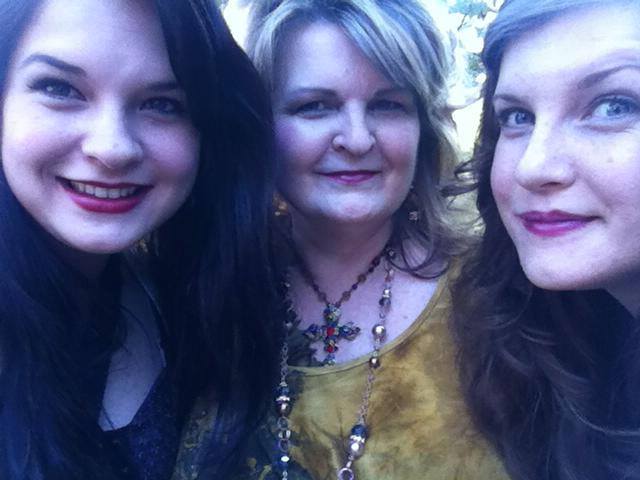 |
| Kathy and her daughters |
In 2008, her own book, The Pulpwood Queen's Tiara-Wearing, Book-Sharing Guide to Life, was published, and we've been corresponding regularly ever since. I finally met Kathy and her daughters, Madeleine and Helaina, at BookExpo 2012 in New York City. She told me then she believed she had "created 'a book world,' a world where we are building lifelong friendships, relationships and community that is truly making our lives for the better." And so she has.
"Life has been about major change this past year for me with my divorce, and move to a new home and shop in Hawkins," she said recently. "The future? Sharing my love of books and mission to promote literacy, of course. My bookstore now only carries Pulpwood Queen Book Club Selections."
In a recent profile, the Longview News-Journal noted that Kathy "fills her days with what she loves: God, books and, of course, big hair"; and that "those who have watched her build the book club over several decades know her spirit, if anything, has gotten stronger."
Kathy's daughters are also an intrinsic part of Girlfriend Weekend. She said they've "been helping me on the weekend since they were little kids. Madeleine is the DJ for my Great Big Ball of Hair Ball and Helaina usually sings and will be helping me and my co-hosts. They are big book lovers like me!"
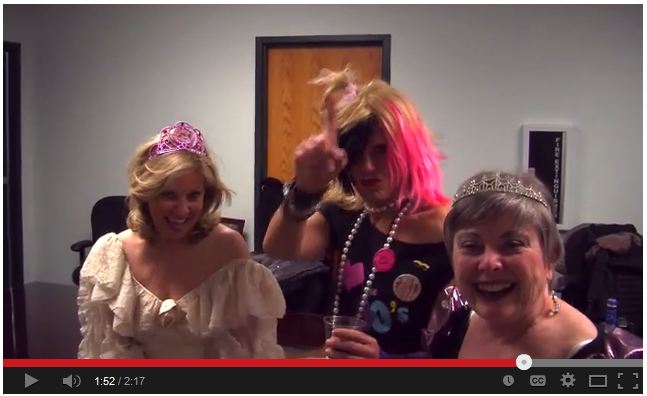 In addition to her day job working at a beauty salon, Kathy is the youth director for the First United Methodist Church of Hawkins. "I love my life here and my church members have enveloped me in big book love," she said, adding that more chapters of the Pulpwood Queens Book Club are in the works, as well as speaking engagements, including one at the upcoming Nacodoches Film Festival where For the Love of Books, William Torgerson's documentary about Girlfriend Weekend, will be screened.
In addition to her day job working at a beauty salon, Kathy is the youth director for the First United Methodist Church of Hawkins. "I love my life here and my church members have enveloped me in big book love," she said, adding that more chapters of the Pulpwood Queens Book Club are in the works, as well as speaking engagements, including one at the upcoming Nacodoches Film Festival where For the Love of Books, William Torgerson's documentary about Girlfriend Weekend, will be screened.
She is also working on an updated and revised edition of her book and talking with a producer in Los Angeles regarding a possible film about her life in books. "Will it happen, who knows?" she said. "But what have I got to lose? I lost my home, my church, my shop this past year, so suddenly I think I'll just go for what comes my way."
Noting that she "never had a clue what I would do in my life, because of books I have had a pretty good run at adventures through reading," Kathy observed: "I still don't know what I want to be, not when I grow up, but what my life's purpose and mission is I have just turned it all over to God. Funny, but that plan of action seems to be working very well for me. I'll just keep on like Johnny Appleseed, sowing away seeds for reading. Onward and upward to Girlfriend Weekend!"
--Published by Shelf Awareness, issue #2168.
Dear FutureMe,
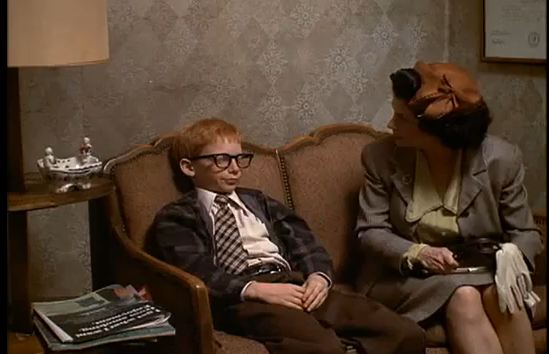 Hope you've stopped worrying. I can't. There are weeks when even the most optimistic toilers in the field of bookselling have their "The universe is expanding.... What's the point?" moments. In Woody Allen's 1977 film Annie Hall, after young Alvy Singer's mother scolds him ("Brooklyn's not expanding!") because he's stopped doing his homework under the intense pressure of cosmic destruction, Dr. Flicker waves his hand grandly through the air and says, "It won't be expanding for billions of years yet, Alvy. And we've gotta try to enjoy ourselves while we're here!"
Hope you've stopped worrying. I can't. There are weeks when even the most optimistic toilers in the field of bookselling have their "The universe is expanding.... What's the point?" moments. In Woody Allen's 1977 film Annie Hall, after young Alvy Singer's mother scolds him ("Brooklyn's not expanding!") because he's stopped doing his homework under the intense pressure of cosmic destruction, Dr. Flicker waves his hand grandly through the air and says, "It won't be expanding for billions of years yet, Alvy. And we've gotta try to enjoy ourselves while we're here!"
My own universe-is-expanding-what's-the-point moment of doubt arrives annually while reading dispatches from the Consumer Electronics Show. This year, just as I'd finally come to terms with the weirdly commonplace nature of e-books floating in the virtual ether and POD titles instantly available in certain indie bookshops, I learned that I now must gear up for the oncoming ubiquity of a "3D printing trend" that "bodes a future in which shoes, eyeglass frames toys and more are printed at home as easily as documents," as AFP described it.
At CES, musician will.i.am, speaking as "creative officer for 3D Systems," predicted that within a decade, "3D printers will be in your house like refrigerators, TVs and microwaves."
Is that true, FutureMe?
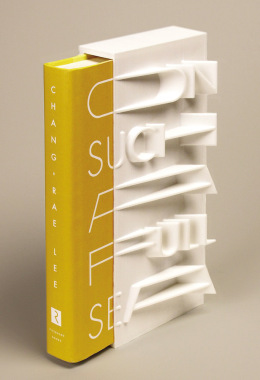 And just when I was thinking print books might be a refuge for now from this one aspect of digital nation's manifest destiny, I read in Time about the intriguing limited edition of Chang-rae Lee's new novel On Such a Full Sea, which "brings publishing into the future (or, rather, one possible future)" with a 3D-printed slipcover that "features the letters of the title rising off the surface at an angle." Time called the innovation "one direction in which the publishing industry could move, at a time when the future of the physical book remains in question: providing fewer readers who are willing to pay more for each purchase with a reason to splurge for the physical object rather than the digital version, turning books into luxury objects."
And just when I was thinking print books might be a refuge for now from this one aspect of digital nation's manifest destiny, I read in Time about the intriguing limited edition of Chang-rae Lee's new novel On Such a Full Sea, which "brings publishing into the future (or, rather, one possible future)" with a 3D-printed slipcover that "features the letters of the title rising off the surface at an angle." Time called the innovation "one direction in which the publishing industry could move, at a time when the future of the physical book remains in question: providing fewer readers who are willing to pay more for each purchase with a reason to splurge for the physical object rather than the digital version, turning books into luxury objects."
Five years ago, Brooklyn-based MakerBot was the only 3D printer company at CES. "Now, it is surrounded by rivals on a large section of show floor devoted to the trend," according to AFP. Company spokesperson Jenifer Howard said, "We feel like this is the year of 3D printing." Was it, FutureMe?
MakerBot plans to market a 3-D Replicator Mini printer this spring for $1,375. "We believe that the MakerBot 3D Ecosystem we are presenting to the world fulfills the vision of a 3D printer for everyone," said company CEO Bre Pettis. "We have laid the groundwork for everyone to be able to be a creative explorer."
Why am I worrying then? I happen to be really good at adapting. POD and e-books already seem so turn-of-the-century to me. And if we really want to get all big-picture about this, as the BBC did recently with its "Timeline for the Far Future," in a thousand years most of our words will be extinct and in a hundred quintillion years the earth will die. Young Alvy Singer didn't know the half of it.
Do you have a 3D printer, FutureMe? Are you printing out life-size characters and scenes to re-create novels in your house and backyard? What do you do with your 3D Huckleberry Finn and Tom Sawyer after you've "read" them? Are they recyclable?
Whatever mind-boggling predictions you're dealing with in your time, FutureMe, please take solace in knowing that some of them will happen (like Arthur C. Clarke's 1974 spot-on explanation of life with a desktop computer), but not all (still waiting for those affordable flying cars). The trick is, as ever, to make our peace with The Machine without getting crushed in its gears or motherboards--or whatever the hell is being invented now to crush you/me later.
Here, at the dawn of 2014, CES and 3D printers notwithstanding, I'm trying to worry less and be more optimistic. Why? Many reasons. Consider Greenlight Bookstore, Community Book Store, WORD, powerHouse Arena, BookCourt, Spoonbill & Sugartown Booksellers.... It turns out that Little Alvy Singer's mother was wrong. Brooklyn is expanding, which gives me hope for the future of indie booksellers everywhere.
Thanks for listening, FutureMe. Write when you can. I'd love to hear from you.
P.S.: How did those Amazon Prime Air delivery drones work out? --Published by Shelf Awareness, issue #2162.
You've seen the illustration again and again. The transition from one year to the next is always represented by an overconfident newborn baby and a scythe-wielding Father Time, accompanied by promises of a fresh starts and lists of resolutions that flutter through the air like Times Square confetti on New Year's Eve.
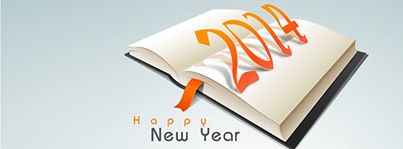 Out with the old and in with the new is the prevailing cultural myth, though author John Green contends that last year's decrepit baby should not necessarily be thrown out with the champagne-laced bathwater because "some encouraging trends and statistics about the current state of humans in the world" indicate that "there are many reasons to be hopeful that 2014 might be the best year on record for humans, even if much of this growth is not (currently) sustainable."
Out with the old and in with the new is the prevailing cultural myth, though author John Green contends that last year's decrepit baby should not necessarily be thrown out with the champagne-laced bathwater because "some encouraging trends and statistics about the current state of humans in the world" indicate that "there are many reasons to be hopeful that 2014 might be the best year on record for humans, even if much of this growth is not (currently) sustainable."
So we've got that going for us.
There probably isn't a book industry equivalent to the baby/old man icon, since a book published last year, if still in mint condition, looks just like a book set to be released next Tuesday (and may be much, much better between the covers). Digital books, you ask? Who knows? Perhaps they will remain forever, if virtually, young. Certainly they seem so right now, though I assume something will come along not too far down the publishing line that will make our current "state-of-the-art" e-book delivery/consumption process seem as archaic as an 8-track tape deck in a 1973 Chevy Caprice Classic.
Does that matter? At the reading core, I don't think it does. Thus my single resolution is the one I make every year. It has been further validated by the recent discovery of Woody Guthrie's 1942 "New Years Rulin's," which included "Read lots good books." For 2014, I'm upping Guthrie's ante by vowing to read lots great books.
It's that simple, and attainable. Everything else about our industry requires a well-honed ability to anticipate and adapt. We all do this, every day of the year, and it's the antithesis of a resolution. You don't resolve to be more adaptable. You are... or you aren't.
Dee Robinson, co-owner of Village Books, Bellingham, Wash., definitely is. On Facebook this week, she eloquently depicted our book trade challenge of living--with resolve if not resolutions--in the future, whether we're poring over advance reader copies and publisher catalogues or...: "For my non-retailer friends, so you have an idea how schizophrenic my life is: It's not 2014 yet, and I've received 3 catalogs with my 2015 calendars I need to buy, with one rep appointment to buy calendars. And on Jan 6 we go to Atlanta gift show to buy Christmas decor/ornaments for next Christmas. Happy New Year!"
The reading life, however, offers a chance for resolutions. Literati Bookstore, Ann Arbor, Mich., shared one: "New Year's Resolution: Finish every book I start. (That includes you, copy of Infinite Jest sitting near my bed since 2011.)." And Brain Pickings offered historical precedent with a publishing twist in the form of a 1977 pledge by Susan Sontag to "have lunch only with Roger [Straus]. ('No, I don't go out for lunch.' Can break this rule once every two weeks.)."
New Year's Day is also a good time to offer sound advice for others to follow. In a post at Bustle, Emma Cueto wrote: "This year as you make your New Year's resolutions to get in shape and stop wasting all your time on social media, there's one other habit you ought to try cultivating: Buy your books from independent bookstores whenever possible. That's right, it's time to ditch Amazon and even Barnes & Noble and take your business elsewhere. Namely to a locally owned bookstore."
Shopping indie "is something you can feel good about, and unlike your other New Year's resolutions, it won't leave you sore from weight lifting or sitting at home alone on a Saturday because you gave up drinking so much," Cueto noted. "So take that money you were going to spend on a gym membership you know you'll stop using by April and invest it in your book shopping. You won't regret it."
Sounds like an excellent and comfortably familiar game plan to me, so here's my slightly revised resolution: I will read lots of great books in 2014 and keep buying them at indie bookstores. --Published by Shelf Awareness, issue #2157.
So... this happened, which led me to think about the delicate, and occasionally indelicate, art of "professional" holiday season gift wrapping. By professional, I mean the people doing the wrapping are being paid. By "people," I mean, of course, booksellers.
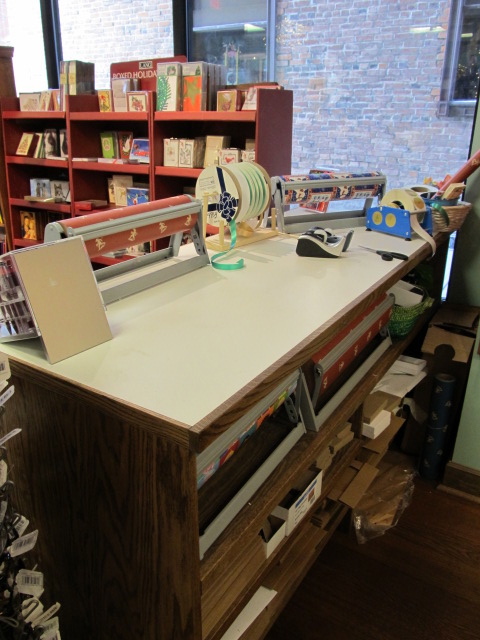 On Christmas Eve, sometime during the late afternoon in most indie bookstores, one final customer will arrive at the checkout counter with an armload of stuff, and a bookseller or two will accept the challenge of wrapping these almost ceremonial purchases. The gift paper choices at that point may be limited; of the three or four or six rolls on display, a couple will no doubt be simple cardboard memorials to Christmas wrap options past.
On Christmas Eve, sometime during the late afternoon in most indie bookstores, one final customer will arrive at the checkout counter with an armload of stuff, and a bookseller or two will accept the challenge of wrapping these almost ceremonial purchases. The gift paper choices at that point may be limited; of the three or four or six rolls on display, a couple will no doubt be simple cardboard memorials to Christmas wrap options past.
But that wrapping station scene represents the culmination of weeks of intense handiwork with paper, ribbons and bows. Some may think booksellers have it easy. I mean, how hard can it be to wrap a book? Those people, however, have never tried to make a presentable present out of a stuffed giraffe or a box-less set of Buddha bookends. There are any number of paper-resistant challenges in a bookstore. Wrapping a cat is mere child's play by comparison. And those doubters have clearly never dealt with a long line of customers armed with very specific requests ("When you wrap that third book, on the outside could you also add this candy cane and this bookmark wrapped separately... and this Virginia Woolf keychain and...?"), each of which is graciously fulfilled.
For booksellers who aspire to greatness this weekend, inspiration can be found among your contemporaries--Patricia Zapata won this year's Scotch Brand Most Gifted Wrapper Contest, which asked competitors to wrap items like a toy castle, a kids' go-kart or a giant two-person paddle boat--as well as your predecessors: Mrs. Juliet Koenig Smith's 1965 obituary in the New York Times called her "a specialist in gift wrapping" who "was often called upon by leading stores for difficult or important projects. She wrapped many gifts for presentation to Presidents and other officials. Once she wrapped an entire automobile for a television commercial."
Could a bookseller do that? Absolutely. Bring on the paddle boats and cars, though I guess we should concede that not all gift wrappers are created equal. Some booksellers were born to wrap; others have gift wrapping duty thrust upon them. You can train almost anyone to wrap a book, but only the truly gifted can draw gasps of appreciation for a well-wrapped stuffed giraffe.
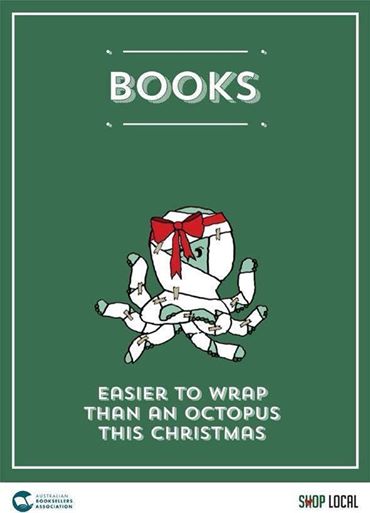 The Australian Booksellers Association has been using the peculiar trials inherent in gift wrapping as a book-selling promotion this year with a series of posters, including "A Christmas Guide: How to Wrap Awkwardly Shaped Presents... Or You Could Just Buy a Book."
The Australian Booksellers Association has been using the peculiar trials inherent in gift wrapping as a book-selling promotion this year with a series of posters, including "A Christmas Guide: How to Wrap Awkwardly Shaped Presents... Or You Could Just Buy a Book."
Wrapping under pressure and public scrutiny is another issue altogether. During holiday crunch time, seasoned booksellers always raise their game while wrapping endless stacks of items, in full view and following detailed instructions ("Put Harry's name on the Grisham and Patterson; Sally on the John Green; Papa on the card game..."). By the way, this is the perfect time to recite a silent, seasonal prayer of thanks for Post-it Notes.
In any endeavor where intensity and volume meet flailing arms and liquid refreshments, disasters inevitably occur. A former colleague reminded me of the time one of our fellow booksellers "jostled a cup of hot chocolate she was drinking into a shopping bag with five really big expensive art books I had just gift-wrapped. They were totally ruined. I had to sneak out of the gift wrap room and surreptitiously find duplicates on the shelf. Luckily, we had every one of them but I was terror-stricken. The customer never knew anything other than her gift wrapping took an extraordinarily long time."
On Tuesday afternoon, after that last gift is wrapped (for customers, anyway) and the bookshop doors are locked, booksellers will be free to exhale and--if I may suggest--take some holiday post-wrapping refreshment advice from chef Mario Batali, who offered the following advice last Sunday in the New York Times: "A cold afternoon of present-wrapping can use a warm touch. Heat up a cup of skim milk with a teaspoon of vanilla and then make a double espresso. Mix the two in a large goblet, then add a shot each of peppermint schnapps and Jack Daniels. Stir gently, then get back to work."
But don't go back to work too soon. Try to get some rest before Thursday because, well, you know the drill. What do most booksellers have to look forward to on the day after Christmas? You'll arrive at work to see a line already forming outside your bookstore in hopes of snatching up discounted gift wrap for next year's holiday season. Next year?!!!--Published by Shelf Awareness, issue #2154.
It struck me that the popularity of Christmas is a matter of web-like consciousness. Childhood conditions us to relax and expand at Christmas, to forget petty worries and irritations and think in terms of universal peace. And so Christmas is the nearest to mystical experience that most human beings ever approach, with its memories of Dickens and Irving's Bracebridge Hall.
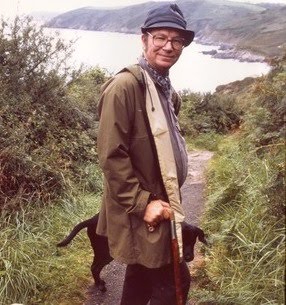 Colin Wilson, who died December 5 at the age of 82, wrote these words in his novel The Philosopher's Stone, first published in 1969 and a book I never considered handselling when I was a bookseller, even though I first read it nearly 40 years ago and have had a copy somewhere on my shelves ever since. Curious.
Colin Wilson, who died December 5 at the age of 82, wrote these words in his novel The Philosopher's Stone, first published in 1969 and a book I never considered handselling when I was a bookseller, even though I first read it nearly 40 years ago and have had a copy somewhere on my shelves ever since. Curious.
The Guardian's obituary called him "Britain's first homegrown existentialist star." Like most other obits, it focused upon his first book. Published in 1956 when Wilson was 24 years old, The Outsider garnered "phenomenal reviews and sales" and "led him to be seen as a potential savior of the human spirit, a thinker who might find a way through the spiritual nullity of the postwar years." Recently, David Bowie included it on his highly-publicized "Top 100 Must Read Books."
Wilson's "passionate inquiry into his themes continued but critics deserted him," the Guardian noted. "He went out of fashion and--though he published more than 100 works--he survived financially only because many of those dealt with murder or the occult as pathways to the insights that fascinated him."
Why should I care? I never thought Wilson was a great writer, but one of the reasons his death struck me is tied, I suspect, to a list meme that has been dominating Facebook lately, at least among its bookish members. You may know the drill. A Facebook friend tags you and shares a list of "10 books that have stayed with you in some way." You craft your own, tag some of your bookish crew, and the virtual world grinds on, literary karma intact.
I was tagged a few times and dutifully created a list. After posting, however, I began to think about that phrase "stayed with you" and Wilson's death. I hadn't listed The Philosopher's Stone, and suddenly realized the book had indeed stayed with me for decades.
It isn't as if Wilson disappeared from my reading life. As recently as 2011, I mentioned him in a Shelf Awareness column, noting that I'd discovered Bruckner's symphonies in the pages of The Philosopher's Stone, which also introduced me to composers Sibelius and Elgar; philosophers Bertrand Russell and Hegel; and even the psychologist Abraham Maslow.
There are some books you can only read in your 20s. Maybe this is one of them, but certain passages do still resonate: "Then I looked across the room at my bookcase.... The sunlight on the bright paper covers produced a sense of euphoria for a moment, but it vanished almost immediately... The sight of the books caused an after-image on the inside of my eyelids. And then, in a flash, I saw with perfect clarity the solution of the problem that had almost driven me to suicide. It was as if I had seen to the inner-nature of the books, and understood that they were not books at all, but a part of the living universe. Each one of them was a window on 'other-ness,' on some place or time not actually present."
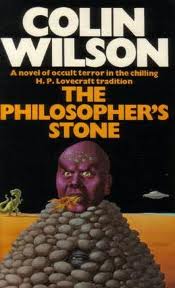 So the Philosopher's Stone has stayed with me, weaving that spell certain books cast, as most readers will understand. "Through books, man has conquered time," Wilson wrote. "The insights of poets and saints are still alive. For two million years, man ascended the evolutionary ladder slowly and painfully, changing hardly more than an ape of the horse. With the invention of books, he took a giant step into the realm of the gods."
So the Philosopher's Stone has stayed with me, weaving that spell certain books cast, as most readers will understand. "Through books, man has conquered time," Wilson wrote. "The insights of poets and saints are still alive. For two million years, man ascended the evolutionary ladder slowly and painfully, changing hardly more than an ape of the horse. With the invention of books, he took a giant step into the realm of the gods."
In her foreword to an American edition of the novel, Joyce Carol Oates praised John Fowles, Doris Lessing, Margaret Drabble and Wilson for "consciously attempting to imagine a new image for man, a new self-image freed of ambiguity, irony and the self-conscious narrowness of the imagination we have inherited from nineteenth-century Romanticism."
That was a tall order, written on the cultural tailwind of the late 60s, but it may well have pushed me closer to The Philosopher's Stone. In an obituary published this morning, the New York Times notes Wilson "argued that it was possible for mankind to achieve this exalted state through the kind of transcendent experience that comes, for instance, in the presence of great works of art."
Unanticipated transcendence is precisely what I recall about reading the novel in my youth. Maybe this year's Christmas season is the perfect time to sink again into that "web-like consciousness" and re-read The Philosopher's Stone, one of those precious books that just "stay with you."
--Published by Shelf Awareness, issue #2149.
In almost any situation, books and gambling can easily be linked by a single degree of separation:
What are the odds that Colm Tóibín would be shortlisted for the Man Booker Prize (currently 7-2 to win at British bookmaker Ladbrokes) and a Tony Award best play finalist during the same year for variations on The Testament of Mary. Has that ever happened before?
What are the odds that Barnes & Noble chairman Len Riggio would also be a member of the board of directors for the New York Racing Association?
What are the odds that Senator John McCain would be caught playing online poker during a Senate Committee on Foreign Relations hearing about Syria? (Book connection? Check out author Matthew Dicks's amusing commentary on the incident.)
What are the odds that in 1981, I'd leave a Santana concert early, drive to the nearby harness track and watch Rambling Willie race during his nationwide book tour for Rambling Willie: The Horse that God Loved? (I bought a copy and had it signed.)
The odds, in each case, are pretty damned good.
A few years ago in the New York Times, Curtis Sittenfeld recalled an editor telling her that "people think publishing is a business, but it's a casino." Living in Saratoga Springs, I'd rather think of it as a horse race, with a mind-numbing list of factors to analyze before placing your bet and hoping for success: consider multiple entries, research past form, evaluate the people involved (owners/trainers/jockeys or writers/publishers/booksellers), weigh the current odds for success/failure and much more. Do your handicapping, eliminate the obvious losers, narrow down the list of potential winners and then place your bet.
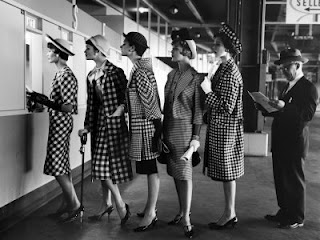 What are the odds you'll be wrong? You know the answer to that one. And yet we keep going back to the book trade window to bet again as we write, publish and market more books, always hoping for the elusive, irresistible combination of luck and performance that makes for a winner, however you might define the term.
What are the odds you'll be wrong? You know the answer to that one. And yet we keep going back to the book trade window to bet again as we write, publish and market more books, always hoping for the elusive, irresistible combination of luck and performance that makes for a winner, however you might define the term.
Speaking of winners, it's that time of year when British bookies train their focus momentarily on the world so closely aligned to their name, even if the stakes are low. The Atlantic pointed out that only £25,000 (US$39,563) was bet with Ladbrokes on the Booker prize last year, compared to as much as £350,000 on an important Premier League soccer match.
Noting that British newspapers traditionally cover major literary prizes in terms of odds, bookmakers "need a dependable, accurate method of calculating them in a way that ensures the house will still win--but also one that doesn't come with a required-reading list for potential bettors," the Atlantic wrote.
"The most important thing to be aware of is critical reception," said Alex Donohue of Ladbrokes. "We do not read all of the books and in actual fact avoid doing so in order to [not] cloud judgment."
Keeping in mind that this is a year in which Hilary Mantel can't win her biennial Booker, here are the current odds from Ladbrokes for two of the Big Games in this fall's book competitions:
Nobel Prize in Literature
Haruki Murakami (3-1)
Joyce Carol Oates (6-1)
Peter Nadas (7-1)
Ko Un (10-1)
Alice Munro (12-1)
Adonis (14-1)
Assia Djebar (14-1)
Philip Roth (16-1)
Amos Oz (16-1)
Thomas Pynchon (20-1)
Ngugi Wa Thiog'o (20-1)
Man Booker Prize
Harvest by Jim Crace (5-2)
The Testament of Mary by Colm Toíbín (7-2)
The Luminaries by Eleanor Catton (4-1)
A Tale for the Time Being by Ruth Ozeki (5-1)
We Need New Names by Noviolet Bulawayo (6-1)
The Lowland by Jhumpa Lahiri (6-1)
"After years of hovering in the wings, this could be Haruki Murakami's year" for the Nobel, according to the Guardian, which pointed out that the Japanese author "has been considered a frontrunner for the past 10 years." But some curious betting trends last week that dramatically reduced Kenya's Ngũgĩ wa Thiong'o's odds are noteworthy, including a large bet at Ladbrokes by "a Swedish customer," the Atlantic reported.
Shortly before the Booker shortlist was announced, Ladbrokes had Crace listed as favorite at the same odds he is now, which may mean something. When the longlist first came out in August, Philip Hensher offered this early handicapping advice: "I can hardly see where else the prize can go than to the long-overdue Crace."
I was one for two in 2012, predicting that Mo Yan would win the Nobel and Alison Moore's The Lighthouse would somehow wrest the Booker from prohibitive favorite Mantel. But it's a new year and gamblers are ever-optimistic. Now it's time for my 2013 predictions. Drum roll, please.... Since no self-respecting, well-read punter would ever bet a favorite, I'm backing Colm Tóibín for the Man Booker Prize and Alice Munro for the Nobel Prize in Literature. So... Who do you like? --Published by Shelf Awareness, issue #2084.
Whether the challenge is increasing sidelines inventory, adding on a complementary business or even opening a sister (or brother, your choice) store in another location, indie booksellers are always exploring ways to increase margins without sacrificing integrity.
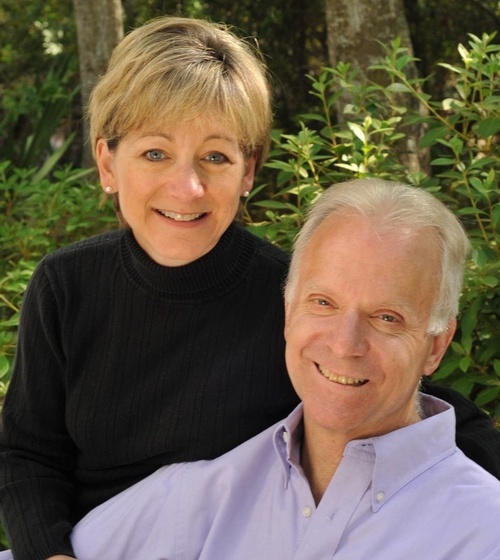 Mark Kaufman and Donna Paz Kaufman run the Bookstore Training and Consulting Group of Paz & Associates. When Mark responded to a recent column, it sparked my curiosity regarding what prospective booksellers might understand about nonbook merchandising possibilities as they consider entering the book trade.
Mark Kaufman and Donna Paz Kaufman run the Bookstore Training and Consulting Group of Paz & Associates. When Mark responded to a recent column, it sparked my curiosity regarding what prospective booksellers might understand about nonbook merchandising possibilities as they consider entering the book trade.
"Before we even read your piece in today's issue of Shelf Awareness, Donna and I were talking over breakfast about how interesting it might be to create a little side-business suggesting appropriate nonbook items that stores could merchandise alongside the book," Mark wrote. "It distresses us no end to hear some booksellers insist that they don't want to sell 'all that crap,' mostly because if you were just to depend on the slim margins available from selling books alone, you'd likely not last very long in business. What we embrace (and teach at our workshops) is that there are plenty of opportunities to offer customers a more interesting selection--and make more money at the same time--without having to add an entirely new business to the bookstore."
Long ago and far away (1993 at the ABA trade show in Miami), I attended one of Donna's workshops during Bookseller School. I wondered how much her advice about nonbook inventory for indie booksellers had changed since then.
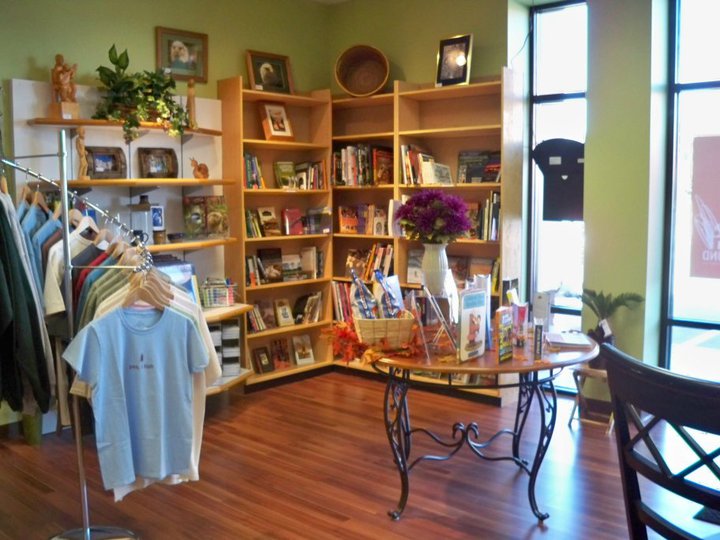 "Even 20 years ago, there was room to launch a bookstore and financially do well without constant worry about cash flow," she recalled. "Retail bookselling today is more of a challenge, requires more creativity and demands many more skills than it used to. We encourage people to consider ways they'll be unique and how they'll become the 'go-to' place in their community for people who love to read. Why not add a little extra to bump up the average sale, especially when you see customers laugh and have a good time finding things in your store? Each combination will be unique, and there is a wide range of general merchandise categories, services, learning opportunities, and food and beverages to help create that special store."
"Even 20 years ago, there was room to launch a bookstore and financially do well without constant worry about cash flow," she recalled. "Retail bookselling today is more of a challenge, requires more creativity and demands many more skills than it used to. We encourage people to consider ways they'll be unique and how they'll become the 'go-to' place in their community for people who love to read. Why not add a little extra to bump up the average sale, especially when you see customers laugh and have a good time finding things in your store? Each combination will be unique, and there is a wide range of general merchandise categories, services, learning opportunities, and food and beverages to help create that special store."
She cited one of her favorite retail stores in Savannah, One Fish, Two Fish, "with a delicious selection of beautiful art, home decor, books, kitchen items, jewelry. You could buy a beautiful set of sheets there and you can find a collection of poetry and cookbooks displayed so you just have to go look (then buy). I just love it. What kind of store is it? It doesn't matter. It's the same with the fabulously successful Anthropologie stores. It's the synergy that creates a special sense of place."
As far as prospective booksellers are concerned, "everyone who comes to our training usually considers themselves readers and most have acknowledged a lifelong dream of owning a bookstore, but in years I haven't seen anyone who spoke of any concerns about carrying general merchandise (a term I prefer since 'sidelines' marginalizes the importance of other items)," she said. "When trainees learn the financial dynamics of a bookstore, it's crystal clear how valuable higher-margin merchandise is to the bottom line. To some, I think that's a real eye-opener. As trainers, we think it's the perfect prompt to help them think more creatively about what's in the store's selection that will appeal to people who like to read."
Noting that her early experience as a bookseller at Davis-Kidd "was a good place for me to learn about the importance of keeping an open mind," Donna observed that small stores of all types "have been hard pressed to compete in today's retail world, which is why we believe it makes sense to morph into more of a general store. 'The Merc' (Mercantile) has been a favorite place of mine in Ann Arbor and it's so much fun to visit because you never know what you'll find. On Amelia Island, we have lost our quality indie toy store, Hallmark store and wine bar and there's no shortage of artful items made by local artisans who are always looking for a place to show their items. While many specialty stores cannot survive on their own, a combination of merchandise can help a bookstore become an even stronger destination."
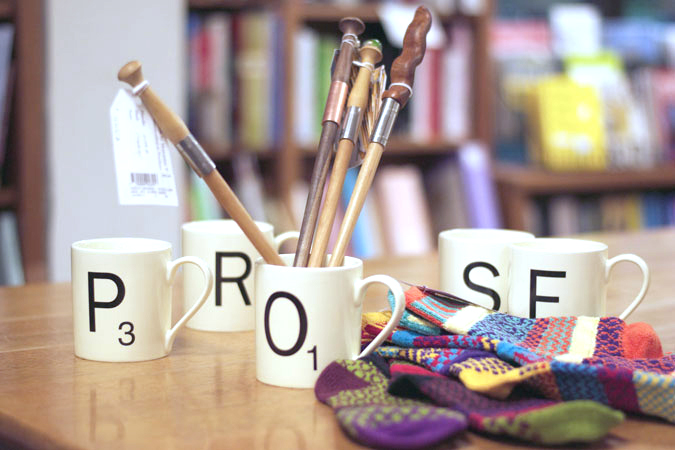 She added that when the big box chains "are selling cheap, imported goods, many hunger for unique, handmade, locally crafted, quality items. Booksellers don't have to sell out or feel compromised. It's smart retailing to keep the selection fresh and exciting, filling niches and seizing opportunities. It's time we focus on serving our target markets (people) instead of being focused purely on our product (books). We are so fortunate to have target markets that value education, have disposable income and understand the importance of local business to sustainable communities. We should be obsessed with catering to their intellectual, spiritual and aspirational needs. A dynamic and lively selection will help us remain interesting, relevant and profitable."
She added that when the big box chains "are selling cheap, imported goods, many hunger for unique, handmade, locally crafted, quality items. Booksellers don't have to sell out or feel compromised. It's smart retailing to keep the selection fresh and exciting, filling niches and seizing opportunities. It's time we focus on serving our target markets (people) instead of being focused purely on our product (books). We are so fortunate to have target markets that value education, have disposable income and understand the importance of local business to sustainable communities. We should be obsessed with catering to their intellectual, spiritual and aspirational needs. A dynamic and lively selection will help us remain interesting, relevant and profitable."
Her conclusion: "I think we're in an era where we are transcending categories and that is a very good thing for all retailers, especially indies." --Published by Shelf Awareness, issue #2079
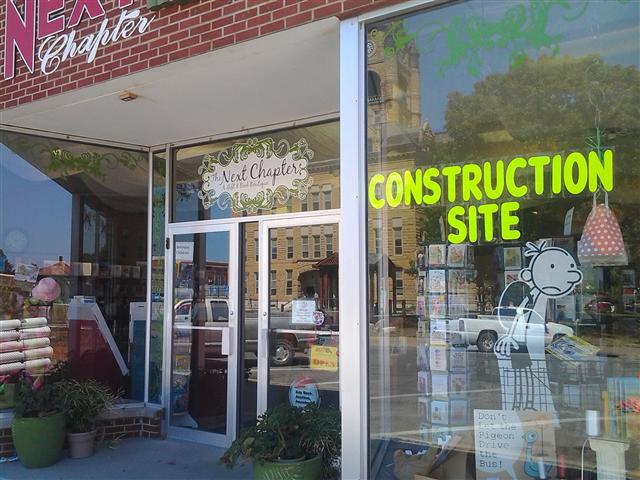 "We try to listen and watch for what there is a need for in our town, staying away from competing with the few other retail shops that are open," wrote Annie Leonard, manager of the Next Chapter Gift and Book Boutique, Knoxville, Iowa, in response to last week's column about adding sideline inventory and retail space to indie bookshops.
"We try to listen and watch for what there is a need for in our town, staying away from competing with the few other retail shops that are open," wrote Annie Leonard, manager of the Next Chapter Gift and Book Boutique, Knoxville, Iowa, in response to last week's column about adding sideline inventory and retail space to indie bookshops.
Knoxville is a small town of about 7,000 people that has "gone through its share of downtown demise, but we have turned the corner and are working hard to revitalize our downtown with lots of thriving restaurants, a great micro-brewery and more--but we're still light on the retail options, which is where the Next Chapter comes in," she observed.
Describing the store as "a full-service indie bookshop with new books for all ages, as well as a basement with thousands of used titles," Leonard noted that the Next Chapter also has a large women's accessories section (scarves, jewelry, bags, gloves, etc.); a children's section with toys and kids' accessories; a stationery section and four rooms of home and garden décor.
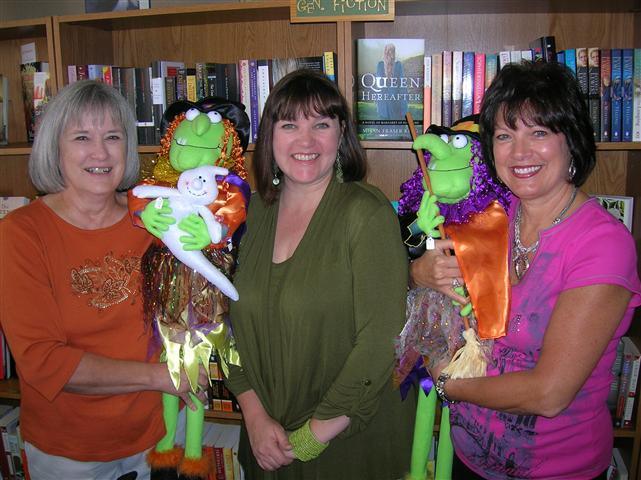 |
| Staffers (l.-r.) Diane Gordon, Annie Leonard and owner Tresa Mott. |
The shop opened more than five years ago in the storefront of a building owned by Tresa and Steve Mott. At the time, Tresa was working as the office manager for her husband's dental practice and running a dance studio in the building, but she had always dreamed of owning a bookstore. She and Leonard knew one another, "so we got together in late July over coffee to talk about the idea of a bookshop," Leonard recalled. "It was magical fun, and by the end of the conversation, we both knew we were on a freight train that wasn't stopping any time soon."
Just as the economy was crashing, the Next Chapter launched in a 1,000-square-foot retail space evenly split between books and gifts. Fortunately, "Our community showed up and Tresa resigned her position at the dental office to be at the bookstore full time," Leonard noted. "In spite of the economic downturn, or maybe in part because of that and the rising gasoline prices, we found that people wanted to shop locally, they liked not having to drive an hour to find gifts and books, and they were willing to give us the business instead of Amazon."
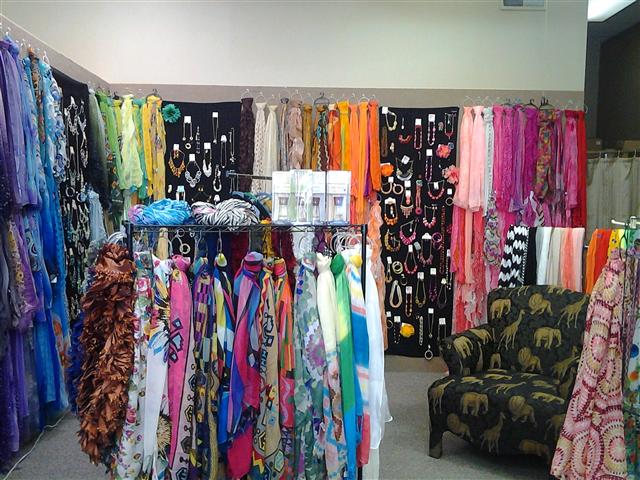 Listening to their customers and monitoring sales numbers closely, the shop has adapted over the years, refining its book selection and expanding women's accessories. After the local Hallmark store closed in 2010, the Next Chapter brought in greeting cards; and a year later, when the local home and garden décor shop closed, the bookstore took over an adjacent empty suite of offices and expanded its inventory to fill another retail void in the town.
Listening to their customers and monitoring sales numbers closely, the shop has adapted over the years, refining its book selection and expanding women's accessories. After the local Hallmark store closed in 2010, the Next Chapter brought in greeting cards; and a year later, when the local home and garden décor shop closed, the bookstore took over an adjacent empty suite of offices and expanded its inventory to fill another retail void in the town.
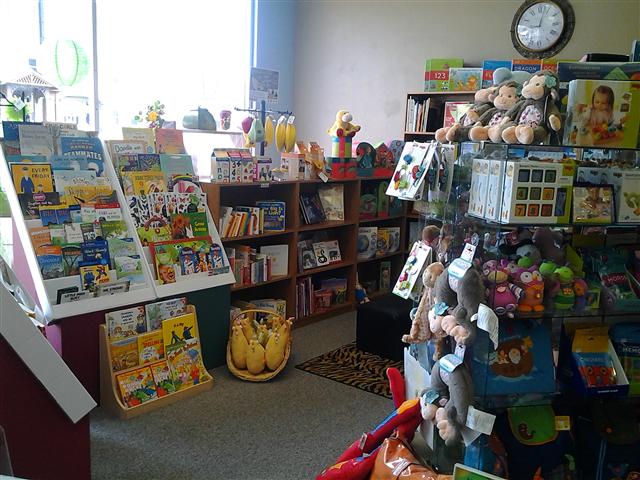 Asked about the decision to call the store a "Gift & Book Boutique," Leonard explained: "Several years ago, a lovely out of town shopper stopped in, shopped the whole place thoroughly, and as she walked out said, 'This isn't just a book shop, it's a book boutique!' We loved the expression, and have adopted it as our tag line. Then, as we expanded and shifted our focus a bit, we commissioned a new logo that more accurately reflected what we are, and since we liked the sound of 'book boutique' we added the word 'gift' first to keep the last two words together. I suppose you could say it was a marketing strategy. We think it sounds good in our many radio ads."
Asked about the decision to call the store a "Gift & Book Boutique," Leonard explained: "Several years ago, a lovely out of town shopper stopped in, shopped the whole place thoroughly, and as she walked out said, 'This isn't just a book shop, it's a book boutique!' We loved the expression, and have adopted it as our tag line. Then, as we expanded and shifted our focus a bit, we commissioned a new logo that more accurately reflected what we are, and since we liked the sound of 'book boutique' we added the word 'gift' first to keep the last two words together. I suppose you could say it was a marketing strategy. We think it sounds good in our many radio ads."
The Next Chapter also carries a selection of food products. "We are really proud of our local artisanal food producers, so when Lois Reichert [Reichert's Dairy Air] approached us and asked if we would sell her cheeses, we were thrilled," Leonard said. "We also have three lines of food items like dips, gourmet chips, sauces, etc., so it was a good fit."
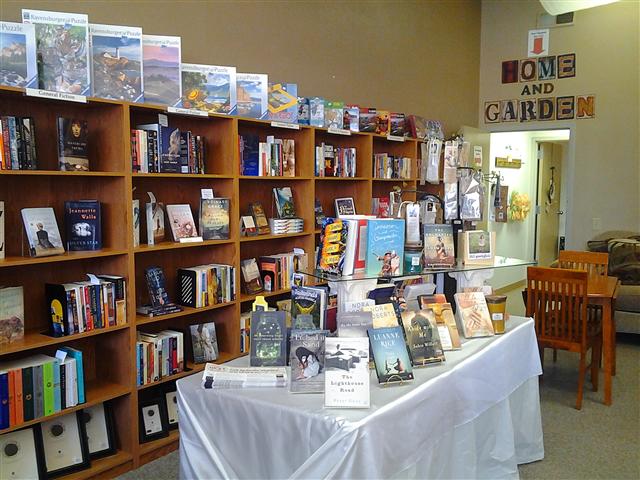 Although books are still the primary focus, narrow profit margins mean they "cannot stand alone," Leonard said. "We have learned to be really smart and selective about what books we carry, and how many of them we can keep in stock. That's been a hard lesson at times, but in the end, I still get to find great books for my customers, and that is tremendously rewarding. Further, I've also learned that picking out beautiful scarves, luxe journals and fun wall hangings is lots of fun, too, and helping our customers find just the right gift or home accent is also very rewarding. In the end, it's about staying in business, being fulfilled and meeting the needs of our community, not necessarily about how many shelf-feet of books we stock."
Although books are still the primary focus, narrow profit margins mean they "cannot stand alone," Leonard said. "We have learned to be really smart and selective about what books we carry, and how many of them we can keep in stock. That's been a hard lesson at times, but in the end, I still get to find great books for my customers, and that is tremendously rewarding. Further, I've also learned that picking out beautiful scarves, luxe journals and fun wall hangings is lots of fun, too, and helping our customers find just the right gift or home accent is also very rewarding. In the end, it's about staying in business, being fulfilled and meeting the needs of our community, not necessarily about how many shelf-feet of books we stock."
Indie booksellers understand more than ever what responding to a community's specific retail needs requires. As Leonard observed, it's all about listening and watching: "I believe that many of our customers view us as a great local option that they are committed to helping stay in business. We very nearly lost every retail business on our square, and that was not a good situation, and lots of locals realized that they would have to participate in changing that situation. We are leading the charge in that local business renaissance, and we hope to be here in the years to come to enjoy the fruits of this labor." --Published by Shelf Awareness, issue #2075.
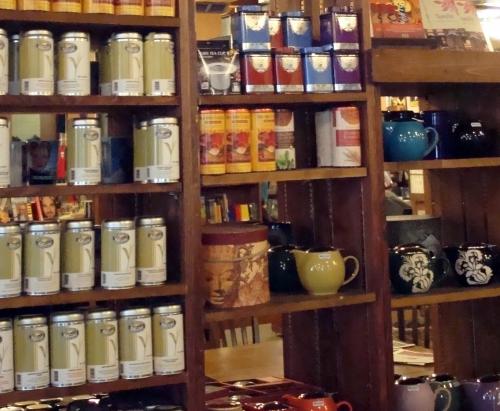 |
| Literary gifts at Tattered Cover, Denver |
Most indie booksellers (Never say all because, well, then the e-mails start pouring in.) have something in common. They love the handselling high that comes from a conversation resulting in a tidy stack of great books leaving the shop with an enthusiastic reader. On the other hand, they'll never complain if the next customer they wait on buys no books at all, but loads up on greeting cards, toys, souvenir t-shirts, tote bags, Moleskin notebooks, scarves, candy, magnets and locally produced salsa.
What does a great indie bookseller say to these bookless patrons?
Thank you so much. Please come back soon.
There are still plenty of shops that are book-only zones, but the business model for many others has changed during the past couple of decades--sometimes gradually and other times instantly; sometimes out of choice and other times out of necessity; sometimes in small ways, other times in ways that alter their business significantly.
In addition to a carrying a wider range of sidelines, indie booksellers are exploring numerous variations on the "two-in-one" theme. Jeffrey Shaffer, a bookseller at Annie Bloom's Books, Portland, Ore., addressed this recently in a NW Book Lovers column headlined "Books 'n' More?". Noting that he "always liked the dual-purpose business concept," Shaffer said he also "likes to theorize about what type of product or service we could add on that would catapult us to new levels of commercial success and customer satisfaction."
His own choice for "an add-on business that would serve a genuinely useful purpose, be self-sustaining, and expand our base of loyal customers" would be a "clean, well-lighted coin-op Laundromat." Considering a colleague's suggestion that an Algonquin Round Table-style "martini bar" might be a suitable add-on, he observed "the practical side of my brain believes that a bookstore serving adult libations may be walking a bit too far on the wild side."
Many bookshops have been walking that wild side, however. The most recent to cross my radar is Old Firehouse Books, Fort Collins, Colo., which will join forces with a nearby pub, the Forge Publick House, to share a newly remodeled event space beginning this fall. The goal is to "increase community togetherness and improve the connection that already exists between independent businesses" in the city. Beer-themed books will be sold in the pub, and beer will be sold at bookstore author events.
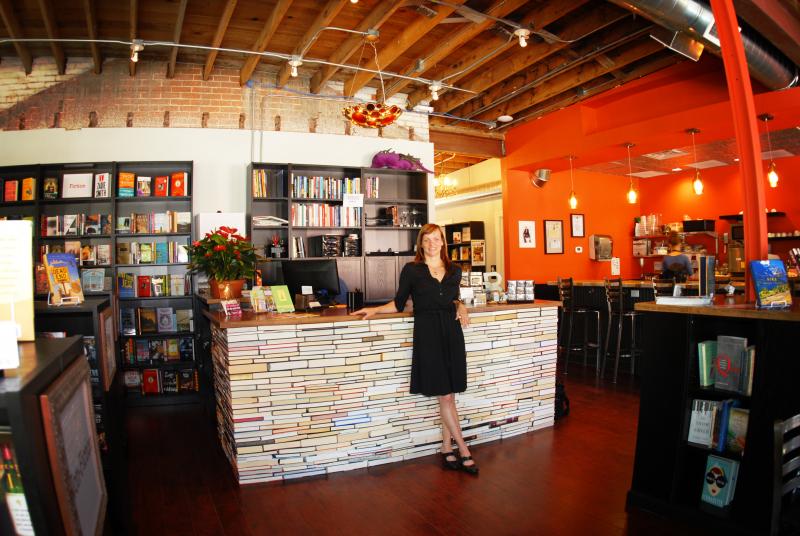 |
| Denver's Bookbar |
Earlier this week we reported that Scuppernong Books, a bookshop/wine bar is coming to Greensboro, N.C. Brooklyn's BookCourt bookstore is planning to open an eight-foot bar overlooking "about five tables placed under a huge skylight at the back of the store" and Denver's BookBar opened in May with the motto: "A book shop for wine lovers. A wine bar for book shoppers."
If you're feeling a little woozy at this point, have some black coffee (plenty of bookstore/cafes around) and remember that the options for an add-on business are limited only by the imagination, a distinct advantage for people who are in the imagination biz.
Shaffer's call for ideas in his NW Book Lovers column generated some Facebook responses, including a question posed to customers by the Village Bookstore, Pleasantville, N.Y.: "If we were to add another business to the store, what should it be?" Answers ranged from the practical--juice bar, antiques ("piles of old postcards in the drawers of wooden desks, awaiting discovery")--to the innovative--"a small greenhouse"--to the somewhat less useful tip that "one business down here is... herbs and cement."
In Tokyo, "some 20,000 western honeybees are being kept on the rooftop" of the Yaesu Book Center (Books 'n Bees?).
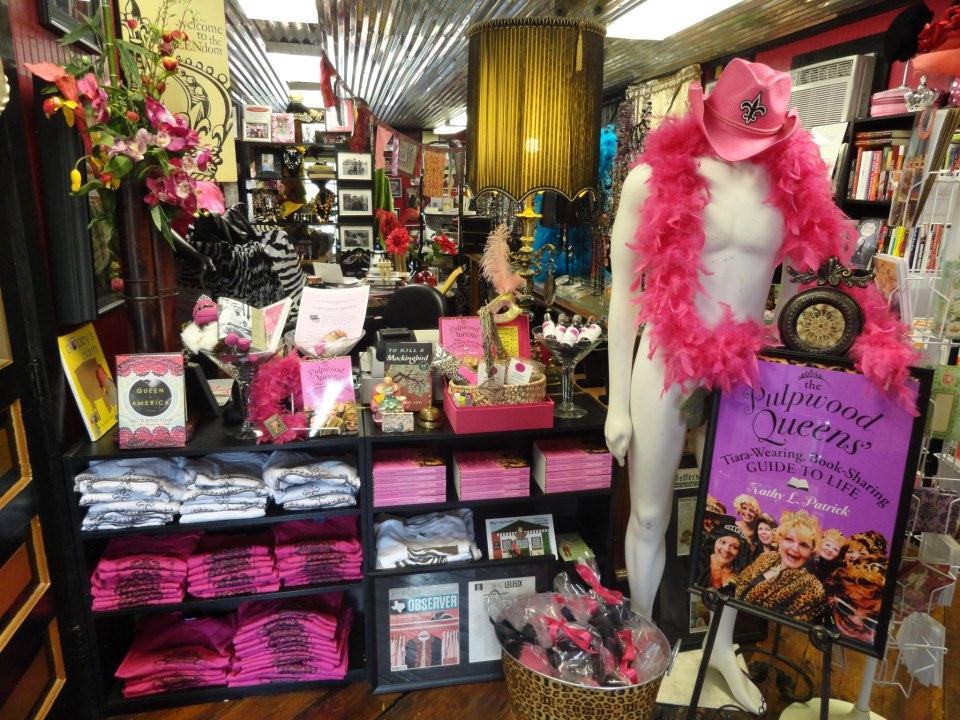 |
| Beauty and the Book, Jefferson, Tex. |
And we certainly couldn't have this discussion without acknowledging our friend Kathy Patrick's Beauty and the Book, "the ONLY Hair Salon/Book Store in the WORLD!"
Independent bookstores already have a legacy of traditional add-on businesses like restaurants/coffee shops (breakfast at Kramerbooks & Afterwords Cafe, Washington, D.C., is always a good bet), publishing (from iconic City Lights Books to the rise of Espresso Book Machine-driven small presses) and sidelines (Village Books, Bellingham, Wash., for example, has a sister store called Paper Dreams).
As for the other possibilities, "endless" is probably as good a word as any. So we'll ask you a variation on the question posed earlier: If you were to add another business to your current store, what would it be? Answers practical as well as impractical are welcome. And if you already have a unique add-on, let us know about that, too. --Published by Shelf Awareness, issue #2070.
"Where's your village? What makes up your village?" asked Kathleen Noonan last week in a Brisbane Courier-Mail piece headlined "Shopkeepers are the heart of the community that we call home." Published on Australia's National Bookshop Day, the essay has been making the book trade social-networking rounds here in the U.S. ever since. And for good reason.
"Just look up your local shop on the Internet or drop in," Noonan advised, noting that she would be "pretending to be a bookseller" behind the counter at Avid Reader bookshop, "hopefully just popping books in brown paper bags, saying knowing things like, 'Oh, the symbolism in that one's magical'--and not actually in charge of tricky credit card transactions."
She wasn't just writing about booksellers, however. Noonan explored the concept of being a shopkeeper now: "We're not talking rustic cutesy row of shops here but the village each of us has in our daily lives, in our routine, that actually helps us survive in a big city. Dealing with the sheer size of the city and chaotic intensity means you have to make your own village, a space where you know people and chat to shopkeepers on a daily basis--your favorite sandwich maker, your dry cleaner.... At the core of these villages are shopkeepers."
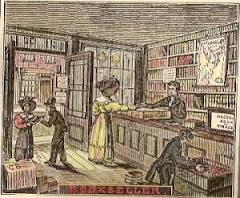 Shopkeepers have not traditionally garnered such high praise. Adam Smith sounded a little snarky in the 18th century: "To found a great empire for the sole purpose of raising up a people of customers, may at first sight, appear a project fit only for a nation of shopkeepers. It is, however, a project altogether unfit for a nation of shopkeepers, but extremely fit for a nation whose government is influenced by shopkeepers."
Shopkeepers have not traditionally garnered such high praise. Adam Smith sounded a little snarky in the 18th century: "To found a great empire for the sole purpose of raising up a people of customers, may at first sight, appear a project fit only for a nation of shopkeepers. It is, however, a project altogether unfit for a nation of shopkeepers, but extremely fit for a nation whose government is influenced by shopkeepers."
As did Henry David Thoreau in the 19th century: "When sometimes I am reminded that the mechanics and shopkeepers stay in their shops not only all the forenoon, but all the afternoon too, sitting with crossed legs, so many of them--as if the legs were made to sit upon, and not to stand or walk upon--I think that they deserve some credit for not having all committed suicide long ago."
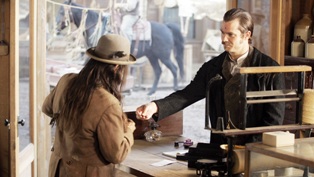 |
| HBO |
I've spent much of my life as a shopkeeper, and I always bristled at the idea that the term was a pejorative. This may come from watching too many westerns, where shopkeepers are traditionally portrayed as either obsequious, sleeve garter-wearing cowards or the widows of obsequious, sleeve garter-wearing cowards. The HBO series Deadwood struck a less insulting shopkeeper chord with Timothy Olyphant's fierce portrayal of Seth Bullock, a man who wants to trade his gunslinging past for a new life as a hardware store shopkeeper, though choosing a lawless South Dakota settlement for his venture complicates things a bit. Imagine an armed Bernard Black.
Customers do not witness the complexity of a shopkeeper's day. Many bookstore patrons, for example, see only an ideal job that involves bookish conversations in a soothing environment, and good booksellers sustain the myth by remaining calm and cordial, even as their work day--an endless cycle of shelving, ordering, straightening, cash register duty and other responsibilities--devolves into an angst-inducing blur. Bookstore patrons don't need to know about any of this, of course.
Shopkeepers play an essential role in fostering our sense of community. As Noonan observed, in addition to "providing a retail service, these shopkeepers make up your village." She also cited author David Malouf's recent observation that "at the heart of a village is often a good bookshop."
"Bookshops are havens. I reckon you are never too scruffy, hungover, or bruised and bewildered to slouch into a bookshop," Noonan concluded. "Books are the friends you don't have to dress up for. They are the lovers that require no stroking of ego or anything else. They are the teachers that set no exams. Bookshops aren't just bookshops. They are ideas shops."
And shopkeepers? Let's just say that in these perilous bookselling times, shopkeeping and community building are not for faint-hearted, sleeve garter-wearing cowards. Maybe it was always so. A 1922 New York Times article, headlined "Shopkeeper of Shakespeare and Company," described legendary Parisian bookseller Sylvia Beach as "efficient and determined, but with her efficiency and determination there was understanding besides." To me, these sound like the core elements of a bookseller... and a shopkeeper... and a village. --Published by Shelf Awareness, issue #2064.
"Those entrepreneurial bookstore owners who can see the opportunities inherent in bringing our communities together online and in real life, and innovating throughout a new age of digital publishing, they, the pioneers and trailblazers, will stay on trend and relevant, playing an important role in modern society and, with our support, continuing to flourish."
You'll probably still be sleeping tomorrow when members of the Australian Booksellers Association begin celebrating the third annual National Bookshop Day (@NatBookshopDay), with bookshops hosting events and promotions across the continent. 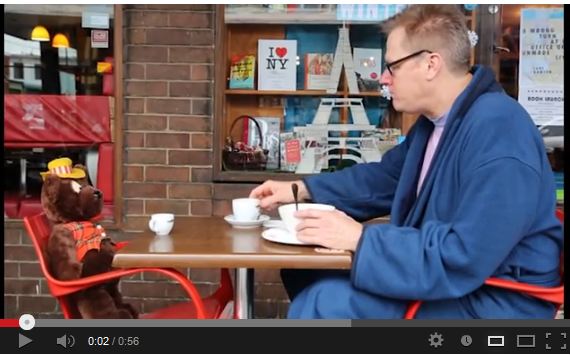 The official launch of the festivities is the announcement of this year's Favorite Bookshop by actor and author William McInnes during a ceremony at the Sun Bookshop, Yarraville. Check out this promo video featuring McInnes that was filmed at the bookstore. And, for good measure, here's another promo featuring NBD ambassador Markus Zusak.
The official launch of the festivities is the announcement of this year's Favorite Bookshop by actor and author William McInnes during a ceremony at the Sun Bookshop, Yarraville. Check out this promo video featuring McInnes that was filmed at the bookstore. And, for good measure, here's another promo featuring NBD ambassador Markus Zusak.
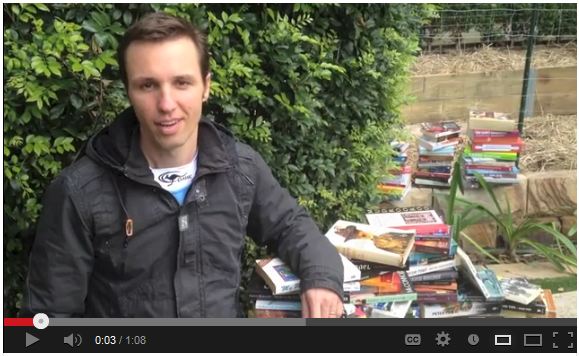 Four Aussie publishers produced free mini-editions for booksellers to distribute to their patrons: Amazing Experiences (Lonely Planet), Rain Queen by Katherine Scholes (Penguin), The Dig Tree by Sarah Murgatroyd (Text), Secret Kingdom Activity Book and Sea Question Activity Book (both from Hachette).
Four Aussie publishers produced free mini-editions for booksellers to distribute to their patrons: Amazing Experiences (Lonely Planet), Rain Queen by Katherine Scholes (Penguin), The Dig Tree by Sarah Murgatroyd (Text), Secret Kingdom Activity Book and Sea Question Activity Book (both from Hachette).
Bloomsbury Australia is running a #lovebookshops campaign across Facebook, Twitter and Instagram, asking booksellers to send photos of their stores.
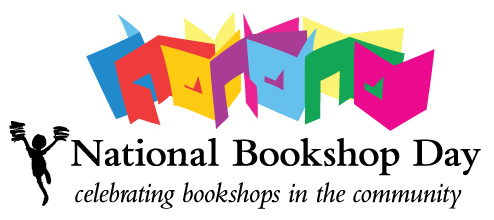 Australian indie booksellers are participating in numerous ways, some of which could easily be in the running as future Shelf Awareness "Cool Idea of the Day" features. Here's a sampling:
Australian indie booksellers are participating in numerous ways, some of which could easily be in the running as future Shelf Awareness "Cool Idea of the Day" features. Here's a sampling:
In addition to hosting the official NBD launch, the Sun Bookshop's Younger Sun store has invited children to dress up as their favorite Leigh Hobbs character, participate in a drawing workshop with the popular author/illustrator and "afterwards join us for fairybread and cordial."
Electric Shadows Bookshop, Canberra, hosts a fundraising event with author and local Labor MP Andrew Leigh to raise funds for the Indigenous Literacy Foundation.
Writers are being put to work behind the counters as celebrity booksellers at Pages & Pages Booksellers as well as at Avid Reader, Brisbane, where other planned events include free henna hand painting and "jazz on the footpath."
The National Bookshop Day theme this year at Potts Point Bookshop is "(Wo)Man's Best Friend and we are hoping you'll agree that there's no better company than a book, other than perhaps your furry companion." Featured events include Dr. Mim & Claire, "who will be opening PP Vet Hospital," a doggie photo booth and Fairy Poppilina, who "will have you barking in your seats with her special storytime session."
At Riverbend Books & Teahouse, Bulimba, the staff is wearing pajamas to work to celebrate local bookstores in the community. "If you are also feeling gluttonous, tired and literary, then come along and join us in the festivities, where we will be encouraging everyone to eat, sleep, and--most importantly--read local. The first 50 adults and 50 children to visit us wearing their pajamas, or even just a dressing gown, will receive a free book!"
"Read-ins" are being held at TLC Books, Manly, where customers are being encouraged to "come down and cop a squat in or around the bookstore and read"; as well as Mary Who? Bookshop, Townsville, where patrons are asked to "bring a chair (or lounge!) and a book and find a spot in the dappled sunlight directly out the front of MW?... to read... in the lovely company of other readers! Bring a crowd if you can!"
Robinsons Bookshops in Frankston, Chadstone and Greensborough are celebrating National Bookshop Day by launching Blind Date with a Book, "a fun way to try new authors and discover great reads ... [that] involves hand-picked quality fiction titles completely wrapped in brown paper. A few vague words are the only hint as to what lies within."
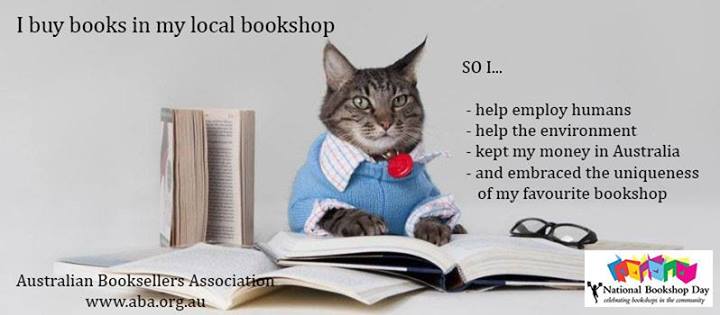 So, happy National Bookshop Day! The ABA's NBD cat probably sums up the festivities best:
So, happy National Bookshop Day! The ABA's NBD cat probably sums up the festivities best:
I buy books in my local bookshop so I...
help employ humans
help the environment
kept my money in Australia
and embraced the uniqueness of my favorite bookshop.
--Published by Shelf Awareness, issue #2059.
While President Obama's visit to an Amazon warehouse in Chattanooga, Tenn., earlier this week has been garnering headlines and well-deserved book industry backlash, I've been lucky enough to witness a less publicized, but no less effective, response to Bezosgate.
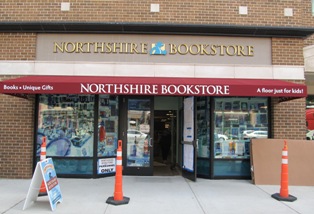 On Monday, the Northshire Bookstore, Manchester Center, Vt., will have a ribbon-cutting ceremony for the soft opening of its highly anticipated second location in Saratoga Springs, N.Y. A grand opening is planned for September 29, when the store is hosting a community-wide celebration.
On Monday, the Northshire Bookstore, Manchester Center, Vt., will have a ribbon-cutting ceremony for the soft opening of its highly anticipated second location in Saratoga Springs, N.Y. A grand opening is planned for September 29, when the store is hosting a community-wide celebration.
If "living well is the best revenge," then perhaps opening a beautiful new independent bookstore in a thriving city just a week after Bezosgate is one of the best retorts anyone could ask for.
As many of you know, I worked at the Northshire as a bookseller and buyer for nearly 15 years before joining Shelf Awareness, and three years ago I moved to Saratoga. While the imminent arrival of the bookstore is a happy coincidence for me, I do have a betting interest--an appropriate phrase for a city that is currently celebrating its 150th anniversary of horse racing--as a resident, customer and fan in the Northshire's success here.
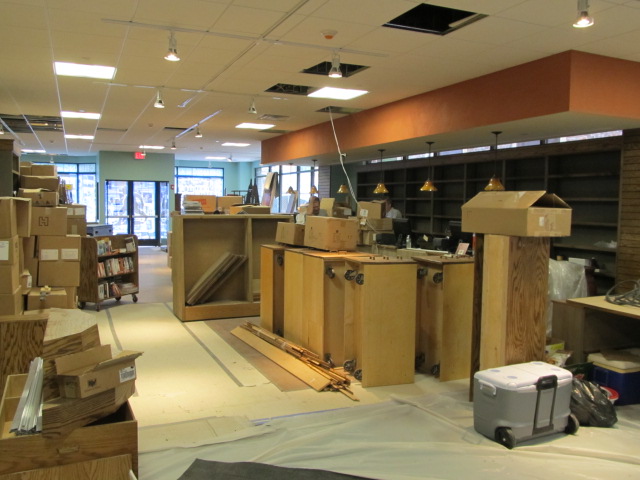 I stopped by last Friday to check out the work-in-progress as opening deadline loomed. Shelving of new books was just getting underway, carpeting was still being installed and fixtures completed. Booksellers and construction workers rushed around, dodging each other as they balanced books, boards and cans of paint.
I stopped by last Friday to check out the work-in-progress as opening deadline loomed. Shelving of new books was just getting underway, carpeting was still being installed and fixtures completed. Booksellers and construction workers rushed around, dodging each other as they balanced books, boards and cans of paint.
A few familiar faces from my past life as a bookseller were there: IT director/buyer Ben Parker working his electronic magic with a new POS system; Barbara Morrow--co-founder, with Ed, of the Northshire in 1976--shelving books; Nancy Scheemaker, my former colleague in Manchester and the new store's general manager, directing traffic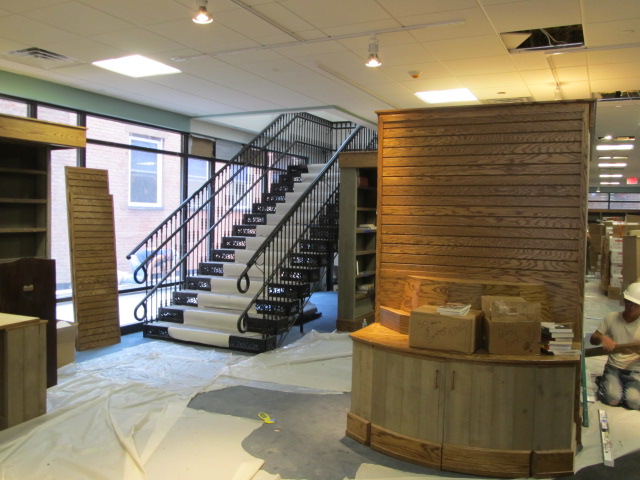 as her staff unpacked, received and organized books in sections temporarily labeled with colored tape; and co-owner Chris Morrow, who was supervising the hectic final rush to get the construction finished, among a hundred other details major and minor.
as her staff unpacked, received and organized books in sections temporarily labeled with colored tape; and co-owner Chris Morrow, who was supervising the hectic final rush to get the construction finished, among a hundred other details major and minor.
On Wednesday, I returned for an updated peek and the pre-launch chaos was well under control, with Monday's opening no longer a distant goal, but as real as the new awning out front. The frenzied yet focused atmosphere reminded me of Manchester Northshire's ambitious expansion a decade ago, when it nearly doubled in size. I still recall that curious mixture of adrenaline and exhaustion, pleasure and pain, that took hold of us as we headed down the home stretch.
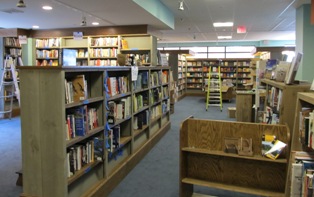 In an e-mail newsletter I received yesterday proclaiming Saratoga as "our second home," the Morrow family said they were "thrilled to be part of this wonderful welcoming community, much as we have been a part of Manchester all these many years. We look forward to hearing from you, what your expectations are, what you like, what is missing, how we can become your bookstore.... We look forward to seeing you in both of our stores and offer our gratitude to all of you for supporting independent book selling."
In an e-mail newsletter I received yesterday proclaiming Saratoga as "our second home," the Morrow family said they were "thrilled to be part of this wonderful welcoming community, much as we have been a part of Manchester all these many years. We look forward to hearing from you, what your expectations are, what you like, what is missing, how we can become your bookstore.... We look forward to seeing you in both of our stores and offer our gratitude to all of you for supporting independent book selling."
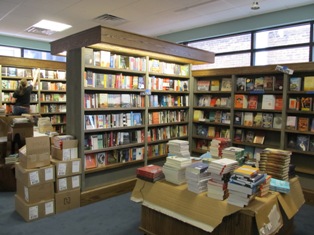 What will happen next? That's what every reader wants to know about each story they encounter, isn't it? When Northshire Bookstore Saratoga debuts Monday, it will be a soft opening in name only because the staff will be off to the races. This is high season for Saratoga, and downtown is packed with visitors from dawn to midnight and beyond every day.
What will happen next? That's what every reader wants to know about each story they encounter, isn't it? When Northshire Bookstore Saratoga debuts Monday, it will be a soft opening in name only because the staff will be off to the races. This is high season for Saratoga, and downtown is packed with visitors from dawn to midnight and beyond every day.
I don't have an answer for what will happen after Labor Day, but if omens mean anything, I believe the 1,500 people who showed up in June for Northshire's Neil Gaiman event at the Saratoga City Center can be seen as a portent. And it must be a good sign that a new Kilwins shop, which is opening soon in the same building, was using a fan to distribute the scent of chocolate onto Broadway Wednesday morning. We all know now what chocolate can do for book sales.
Chris and I talked briefly on Wednesday and naturally the subject of Obama's Amazon warehouse speech came up. I'd considered asking him for a comment regarding the controversy, but standing in that newborn indie bookstore, I suddenly decided there was no need. The answer was all around us. --Published by Shelf Awareness, issue #2054
"How Google Rediscovered the 19th Century." This headline for Paula Findlen's essay in the Chronicle of Higher Education caught my attention, as did her contention that the "digitization of the long 19th century (materials published between the late 18th and early 20th centuries) has made accessible and searchable scholarly work that has been neglected because it was considered too dated and too unreliable.... When we read the past, we acknowledge that we stand not only, as Isaac Newton put it, on the shoulders of giants, but also on those of scholars of smaller stature who were no less passionate about their subjects and determined in their own way to contribute to the intellectual conversation."
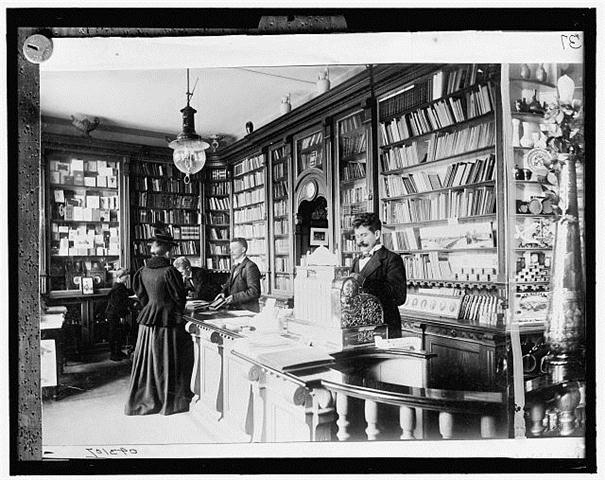 This applies to far more than just scholarly work or the Borgesian virtual library Google is building. I'm absolutely fascinated by the vast depths of historical information about the book trade now accessible through the archives of publications like the New York Times and Harper's.
This applies to far more than just scholarly work or the Borgesian virtual library Google is building. I'm absolutely fascinated by the vast depths of historical information about the book trade now accessible through the archives of publications like the New York Times and Harper's.
"An archivist serves the reader's desires," wrote Martha Cooley in her novel, The Archivist. From time to time, I like to unearth shards of bookselling's past for your inspection. I'm no archivist, but there is an endless array of small treasures to be found in the digital stacks that offer, among other gifts, historical perspective. Who were our book trade predecessors? What did they love? What were they worried about? This week's exhibition includes a pair of fragments from the early 20th century:
July 11, 1908: In a letter to the editor of the New York Times, headlined "Saving Bookstores from Extinction," Frank H. Dodd, president of the American Publishers' Association, addressed a decision by the Appellate Division of the New York Supreme Court in favor the APA over Macy's regarding an anti-trust case. The judge declared that Macy's was not entitled to damages because of the publishers' refusal to sell them copyrighted books the department store planned to discount. This would not be the end of the case, but it does offer an interesting moment of reflection on the role of the bookseller.
"The object which the publishers have all along had in view is not to increase their own prices or profits, but to guarantee dealers in books a fair profit such as will enable them to maintain themselves, and thus to preserve the book store from decline or even extinction," Dodd wrote. "It is not always realized that this occupation so serviceable, if not vital, to the intelligence of the community is yet, in the nature of the case, poorly remunerated. Compared to those dealing in the necessaries or even luxuries of life, it is of small volume, infinite detail, and large expense in proportion to output. It requires special training and unusual intelligence. Not only must a bookseller be familiar with the names, publishers, and contents of the 8,000 or 10,000 new books issued every year, but also with 50,000 to 100,000 older books which are in print and demanded from time to time, to say nothing of the vast field of old books. This applies to the business of the book store proper and to some of the best of the department stores. In many of the department stores, however, books are dealt with in a different fashion. Their stock consists of standard authors and the more popular novels of the day. As can readily be seen, this plan excludes from display and sale the more serious books of literary value which are really the more important."
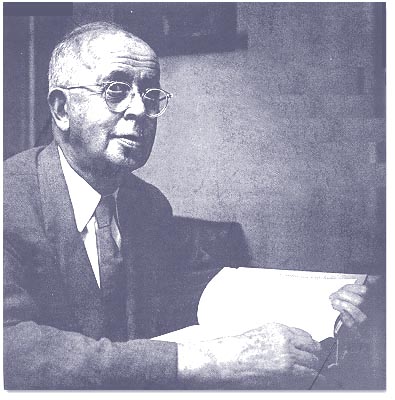 May 16, 1912: The New York Times featured a report on the Booksellers' Convention, held at the Hotel Astor, and a speech by Frederick G. Melcher of the Charles E. Lauriat Company on the subject of "Bookseller and Public."
May 16, 1912: The New York Times featured a report on the Booksellers' Convention, held at the Hotel Astor, and a speech by Frederick G. Melcher of the Charles E. Lauriat Company on the subject of "Bookseller and Public."
"The profession of bookselling has fallen and this generation must build it up," said Melcher. "With shrinking profit salaries shrank, and poorer men manned the floors; with poorer men the sales shrank. You, who manage the stores, must draft the best men you can and keep them by paying for good service. Think of what a profession it is. Compare the pleasures of handling books to handling hardware; compare the customers with the customers of a wool house. Why don't some of you engage college men? College men go out to teach at $1,000 a year. Some of you could afford to pay them that for what they would bring you. Our stores must have men whose interest in books does not stop at the door, who can learn to love a handsome page, warm to a beautiful binding, and to whom caring for stock is a labor of love. The public is going to take its trade to the man who sells his fiction with care, juveniles with understanding, sets with enthusiasm, and who will patiently follow to the end his obscure inquiries." --Published by Shelf Awareness, issue #2048.
And so it came to pass that e-books rained upon them for 40 days and 40 nights (more or less... well, more), and he was commanded to preserve the future by building a library shelter from wooden bookshelves that would hold two each of all the advanced reader copies in the land at that moment in time. And thus he did, before seeking refuge from the digital storm. And lo, the e-books continued to rain and rain until, one day, he simply left his refuge, realizing that the weather wasn't going to change and yet he could still walk freely in the downpour. His ARCs, however, were no longer relevant. The future had come and gone again. And he saw that it was... complicated. The End.
Because we're book people, we tend to live in the future. ARCs are perhaps the most visible sign of this, but many of us find it hard to resist the siren song of endless predictions about our industry. We hope to define shadows. Maybe I'm delirious from the current heat wave, but I'm beginning to see the future as a developing recipe for, say, sea salt caramel swirl gelato, with past and present adding flavor and texture.
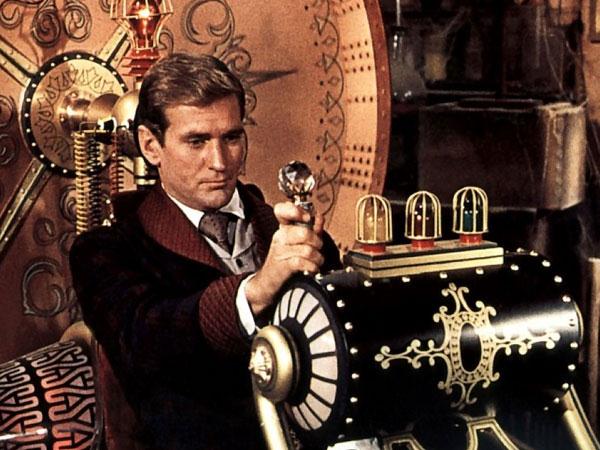 Straightforward timelines are, by comparison, much more comforting. Picture Rod Taylor in the 1960 film version of The Time Machine. Emotionally and philosophically dyspeptic after a frustrating New Year's Eve dinner with doubting friends, he sits in his invention, an elegant Victorian time sled. He reaches for a crystal knob and pushes "the lever forward ever so slightly."
Straightforward timelines are, by comparison, much more comforting. Picture Rod Taylor in the 1960 film version of The Time Machine. Emotionally and philosophically dyspeptic after a frustrating New Year's Eve dinner with doubting friends, he sits in his invention, an elegant Victorian time sled. He reaches for a crystal knob and pushes "the lever forward ever so slightly."
The future of books we try to anticipate is unnervingly just out of sight and reach, unpredictable, consistently resisting our attempts to turn it into an easy-to-follow recipe. Just consider the ingredients that have been swirling through my overheated, bookish brain this week alone, including our headline in yesterday morning's issue: "AAP Sales: E-Books Come Down to Earth in First Quarter."
Or Monday's New York Times piece that reported retailers can "gather data about in-store shoppers' behavior and moods, using video surveillance and signals from their cellphones and apps to learn information as varied as their sex, how many minutes they spend in the candy aisle and how long they look at merchandise before buying it."
In response, Venture Beat contended that for retailers, "the goal shouldn't be to emulate Amazon and envy its data and price-driven hegemony--it should be offer a very different experience from Amazon: More human, more comfortable, and less about viewing customers as sacks of data and more as, well, people."
An indie bookseller offered reassurance to customers: "While I do think that it makes sense for brick-and-mortar stores (or 'real' stores, as I think of them) to take advantage of some of the same strategies online stores use, I would like to assure you that we are not tracking your movements through your cell phone. But we are paying attention. In a good way. :)"
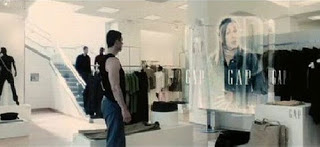 Then I recalled a scene in Minority Report. Tom Cruise, who's had some sort of eye transplant (long story, already forgotten) enters a store, where a woman's face projected on a flat-screen monitor greets him: "Good afternoon, Mr. Yakamoto. Welcome back to the Gap. How'd those assorted tank tops work out for you?"
Then I recalled a scene in Minority Report. Tom Cruise, who's had some sort of eye transplant (long story, already forgotten) enters a store, where a woman's face projected on a flat-screen monitor greets him: "Good afternoon, Mr. Yakamoto. Welcome back to the Gap. How'd those assorted tank tops work out for you?"
I also read a new Harper's piece headlined "Beyond the Book," in which Mark Kingwell observes that the "scope of technology's effects lies on a timescale none of us can survey, creating only opportunities for self-serving predictions--either wildly optimistic or comprehensively gloomy, depending on your interests, age, and health plan. More important, these of-the-moment technology-driven concerns do not get us closer to the heart of reading, which is a matter of human consciousness."
And that reminded me of something from the past. I checked my own time machine, a non-Victorian MacBook Air with far too many saved ancient hyperlinks, and found this: "Futures of anything tend to combine possibilities, desiderata, and dreaded outcomes, sometimes in one sentence," wrote China Miéville last August in the Guardian. "There's a feedback loop between soothsaying and the sooth said, analysis is bet and aspiration and warning. I want to plural, to discuss not the novel but novels, not the future, but futures. I'm an anguished optimist."
In Harper's, Kingwell concludes that "we will continue to argue about all this, just as Socrates and Phaedrus argued the relative merits of reading and speaking more than two millennia ago." Perhaps I'm left only with a recipe for the foreseeable future that is this coming weekend: Blend an excellent ARC (The Cartographer of No Man's Land by P.S. Duffy) with generous portions of cool AC and cooler SSCSG (sea salt caramel swirl gelato). My bookish future... is now --Published by Shelf Awareness, issue #2043.
Last month in Shelf Awareness for Readers, I wrote about desert island reads, noting that the catalyst had been a box of old books in which I found a 1996 Book Lover's page-a-day calendar (Workman) that included a scattering of picks, mine among them, under the heading "Your Bookseller Recommends."
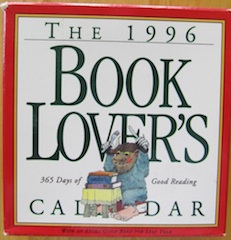 I've been a little haunted by this handsellers' time capsule ever since, and a couple of days ago, I tore off the bookseller pages and spread them out in front of me like tarot cards. I was reading the past, however, not the future, thinking about bookstores now closed (A Clean, Well-Lighted Place for Books) and still open (Hicklebee's); thinking about great booksellers like Roberta Rubin, who recently sold the Book Stall at Chestnut Court, and the late, inimitable Warren Cassell, who for years owned Just Books, Greenwich, Conn.
I've been a little haunted by this handsellers' time capsule ever since, and a couple of days ago, I tore off the bookseller pages and spread them out in front of me like tarot cards. I was reading the past, however, not the future, thinking about bookstores now closed (A Clean, Well-Lighted Place for Books) and still open (Hicklebee's); thinking about great booksellers like Roberta Rubin, who recently sold the Book Stall at Chestnut Court, and the late, inimitable Warren Cassell, who for years owned Just Books, Greenwich, Conn.
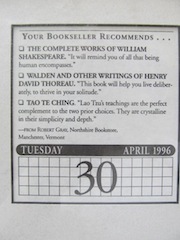 "Inspiration" was a word that came to mind; "legacy" another. More than calendar pages, more than a time capsule, these page-a-day shelf talkers seemed like buried treasure unearthed, and worth sharing:
"Inspiration" was a word that came to mind; "legacy" another. More than calendar pages, more than a time capsule, these page-a-day shelf talkers seemed like buried treasure unearthed, and worth sharing:
January 19
Carrie Thiederman, A Clean, Well-Lighted Place for Books, San Francisco, Calif.
Beloved by Toni Morrison: "More incredible with each read... keeps unfolding."
Collected Stories by William Trevor: "A big-volume storyteller who's a master of character creations."
Complete Works of Shakespeare: "Do you really need a reason?"
Emperor of the Air by Ethan Canin: "A winner, hands down."
March 11
Booksellers at John Cole's BookShop, La Jolla, Calif.
Stones for Ibarra by Harriet Doerr: "Completely autobiographical but written as a novel." --Barbara Cole
Prince of Tides by Pat Conroy: "I Liked this book for the strong character development and the overall theme that we are all a product of our past." --Jan Iverson
War and Peace by Leo Tolstoy: "Because of the interesting history and the development of the characters, I return to this book often." --Alice Kirby
May 15
Norman Laurila, A Different Light, New York, N.Y.
The Raj Quartet by Paul Scott: "A monumental intricate work--even more spellbinding than the Masterpiece Theatre version."
Last Watch of the Night by Paul Monette: "Monette's passionate, searingly articulate look at his own life and what it means to be gay today.
A Single Man by Christopher Isherwood: "A legendary novel of a day in the life of a gay college professor in 1962. Isherwood at his best--wry, suddenly manic, constantly funny, surprisingly sad and bitingly honest."
June 13
Claudia P. Castle, Chinook Bookshop, Colorado Springs, Colo.
Shakespeare's Complete Works
The Oxford Book of American Verse
How to Do Things Right by L.R. Hills: "I think it's fair to say all would hold up to infinite readings, and would be fine company for 30 or 40 years."
August 27
Valerie Lewis, Hicklebee's, San Jose, Calif.:
The World of Christopher Robin by A.A. Milne: "These poems are repeatable... And, first published in 1924, they're still up to date.
Don't Fidget a Feather by Erica Silverman: "A freeze-in-place contest every child (and adult) will try to win."
Freak the Mighty by Rodman Philbrick, Maniac McGee by Jerry Spinelli and Catherine Called Birdie by Karen Cushman: "Young adult books that get my attention on the first page with rich language and strong characters."
September 29
Warren Cassell, Just Books, Greenwich, Conn.
The Bridges of Madison County by Robert James Waller: "It's every middle-aged person's fantasy, and I could read it over and over again, pondering, 'What if?' "
Ladder of Years by Anne Tyler: "A compulsively readable contemporary novel about a woman married 20 years who walks away from her family and establishes a new identity."
Where the Heart Is by Billie Letts: "A first novel packed with absolutely delightful character in a great story with a truly happy ending. This is our feel good book of the year."
November 4
Karen Davis, Davis-Kidd Booksellers of Memphis, Nashville & Knoxville, Tenn.
Wild Birds by Wendell Berry
West with the Night by Beryl Markham
Their Eyes Were Watching God by Zora Neale Hurston
December 31
Roberta Rubin, The Book Stall at Chestnut Court, Winnetka, Ill.
The Battle Cry of Freedom by James McPherson: "For history buffs, or for those interested in a good story, this book is... one of the best descriptions of the Civil War."
Angel of Repose & Crossing to Safety by Wallace Stegner: "One of the great 20th-century writers crosses the expanse of America in both physical and psychological terms."
The Palace Thief by Ethan Kanin: "How does a young man of 31 know so much about the human condition?"
The English Patient by Michael Ondaatje: "A beautiful love story, war story and work of art."
Remembering the past, adapting to the future. That's what booksellers do. I was thinking about Warren Cassell, who sold Just Books in 2002, but never stopped being a bookseller at heart. He would e-mail me occasionally regarding industry issues. The last time was in December, 2010, a couple months before his death at 80. I'd just written a column about occasionally being mistaken for a bookseller by other customers when visiting bookstores because, apparently, my 15 years on a sales floor had given me the "bookseller look."
"Almost the same thing happened to me in Powell's a few months ago," Cassell wrote. "I was asked directions with a 'I thought you worked here' comment. If we packaged that look, we could make a million selling it to all those people who comment, 'I would just love to work in a bookstore.' "
There are worse people in this world to be mistaken for than a bookseller. Our island is never deserted, and there are always plenty of great books to read. --Published by Shelf Awareness, issue #2037.
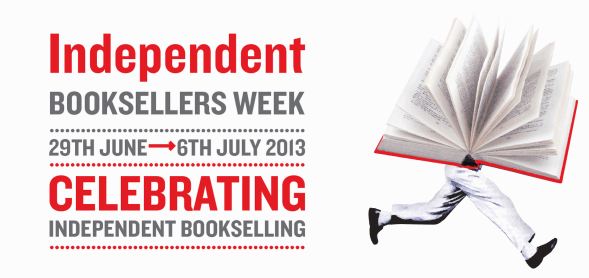 While we're celebrating our big independence win over England 237 years ago, the United Kingdom isn't holding a candlelight vigil this week, mourning colonies found and lost. Instead, they are in the midst of Independent Booksellers Week, with 360 bookstores offering "an eclectic range of events across the country," the Bookseller reported.
While we're celebrating our big independence win over England 237 years ago, the United Kingdom isn't holding a candlelight vigil this week, mourning colonies found and lost. Instead, they are in the midst of Independent Booksellers Week, with 360 bookstores offering "an eclectic range of events across the country," the Bookseller reported.
"We have a record number of bookshops taking part, and this year's IBW is looking set to be the biggest and best yet," said Meryl Halls, head of membership services for the Booksellers Association, which is featuring a Facebook photo page as well as ongoing reports from IBW participants on Twitter (#IBW2013).
"I do feel that the week has a higher profile. Customers know about it and certainly there's a much higher profile of it within the trade," added Sheila O'Reilly, owner of Dulwich Books.
"Independent bookshops are the keystone species of our cultural ecosystem," wrote Ruth Ozeki, winner of this year's IBW Book Award in the adult category for A Tale for the Time Being (R.J. Palacio's Wonder was the children's winner). "When they are endangered, the rest of our species is imperiled as well. When they flourish, so do we all. Luckily, we know this somehow. Independent booksellers are an adaptable and resilient lot, and readers and writers are loyal and stubborn, and together we form a strong relationship of symbiotic mutualism."
In the Guardian, literary agent and bookseller Felicity Rubinstein offered "five good reasons to support your local indie bookshop":
- To make sure that good writers continue to be published
- Variety
- Ethical shopping
- To keep us from folding
- To maintain property prices in your area
Melville House Books, which recently opened Melville House UK in London, checked on the current state of independence for British booksellers Keith Smith of Warwick and Kenilworth Books, Jonathan Main of The Bookseller Crow and Nik Górecki of Housmans bookshop.
Author Kate Mosse and bookseller Nic Bottomley, owner of Mr. B's Emporium of Reading Delights in Bath, were part of IBW's headline event, a Southbank Centre debate among six industry experts titled "The Perfect Storm: Why Bookshops Are in the Frontline in the Battle for the High Street," the Bookseller noted.
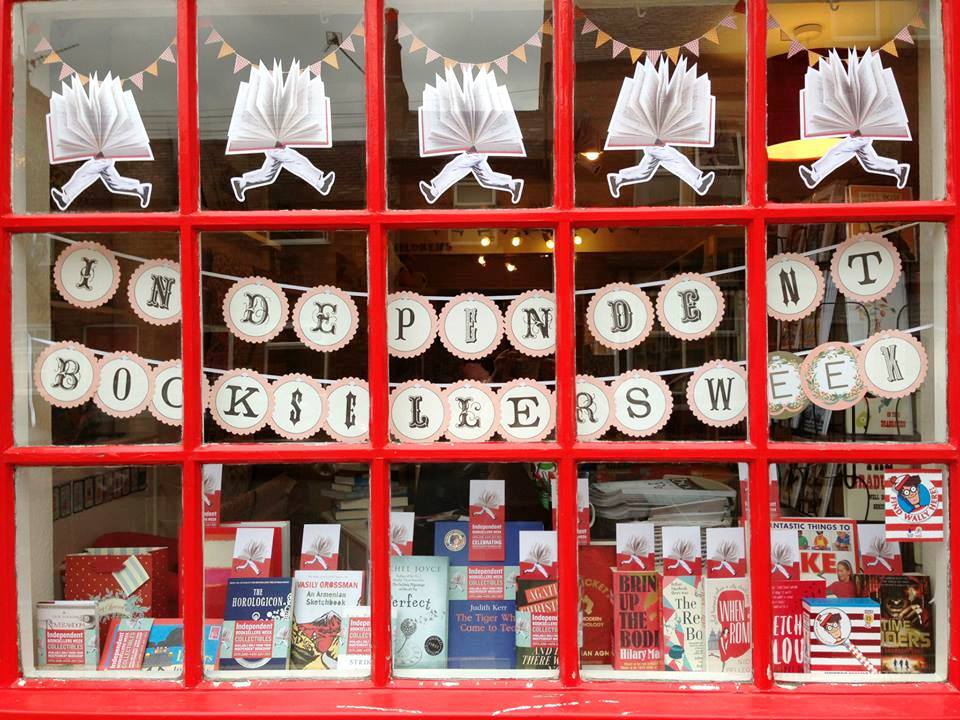 "We should be saying we as a society think bookshops matter," said Mosse. "It is a statement of who we think we are as a society. It is not about value for money all the time--we do not have to go along with that. I do not think there is a single person in this room that hasn't bought a book from Amazon, but reading books and buying from stores matters more than that. We should have the courage to say 'free' isn't everything."
"We should be saying we as a society think bookshops matter," said Mosse. "It is a statement of who we think we are as a society. It is not about value for money all the time--we do not have to go along with that. I do not think there is a single person in this room that hasn't bought a book from Amazon, but reading books and buying from stores matters more than that. We should have the courage to say 'free' isn't everything."
"People talk about bookshops as places of discovery, but we also need to be places of purchase," Bottomley observed. "I think we should be places of acquisition. Nobody showrooms from us because by the end of it they want to pick up a book and walk away with it after a visit. It is not just customer service, it is taking that to the next level, it is sexing it up, pimped for the 21st century."
He also presented a "personal, undoubtedly incomplete, manifesto for 21st century independent bookselling":
- Do one thing differently every week.
- Tell everyone what you're doing. Tell customers what's happening at your shop; tell publishers which of their books you're selling hard; tell the press anything remotely interesting. It will come back to help you.
- Never pay for advertising.
- Copy good ideas from other geographically distant independent businesses.
- Inspire 10 book-lovers every day; convert one book-agnostic every day.
- Surround yourself with creative booksellers who love books as much as you and can wax on about them even better than you.
- Use social media.
- Use the time you were going to spend bitching about Amazon to work out, realistically, what your business needs from publishers. Tell the publishers.
- Create a community. Hold events and book groups that are so good people will attend even if they've never heard of the author and that afterwards they'll rave about to everyone they know.
- Don't give excellent customer service. Give extreme customer service--so that you become part of the fabric of your customers' lives. They will do your advertising for you
- Sell e-readers now if you love them as much as physical books. If not, wait until the margins are plausible before you think about it and in the meantime carry on selling books.
- Don't buy stock from Amazon.
- Be surprisingly cut-throat and financially driven when no-one is looking; Aim not to survive, but to thrive.
Almost sounds like a Declaration of Bookseller Independence. --Published by Shelf Awareness, issue #2032.
"Do you have a public restroom?" If there's a question booksellers hear more often than that one, I'm not sure what it is ("Where's your nonfiction section?" Not even close). And yet, I've been attending industry trade shows for more than two decades without ever seeing a panel devoted to independent bookstores and their public bathroom strategies.
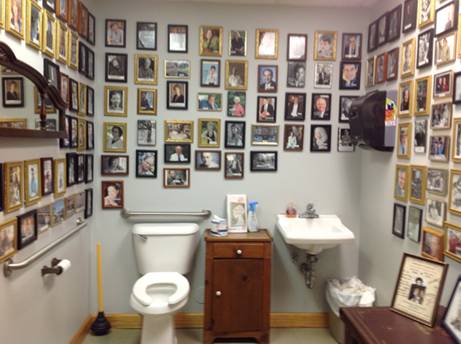 |
| The Wall of Fame at Quail Ridge Books |
Do we simply choose not to talk about it? I don't know, but I've been privy (pun intended) to numerous discussions with booksellers and other retailers over the years about the topic, especially when a new bookstore is in the works or an older one is being renovated.
I should mention that full credit/blame for this week's column goes to Pamela Grath, owner of Dog Ears Books, Northport, Mich. On Sunday, she e-mailed me the following: "Operating a bookstore is a continual learning experience. This year I've figured out that people do not have bathrooms on their Kindles."
Was I intrigued? Of course. "What's the backstory?" I asked. "There must have been an incident?"
"A series of incidents, none interesting enough to recount," Grath replied. "I'm sure you can imagine the general trend."
For the record, Amazon has not perfected a Kindle digital bathroom, though I'm sure they have a patent pending somewhere.
And while BEA seminars may be AWOL, bookstore bathrooms do occasionally make news:
- Reporting for us during her 18,000-mile author tour for Cover of Snow, Jenny Milchman noted "the lofty company of all the authors who have come to this bookstore--and who are on display in the bathroom" at Quail Ridge Books, Raleigh, N.C.
- Avid Bookshop, Athens, Ga., has a bathroom Door O' Fame.
- Indie booksellers have been known to gather in a bathroom for post-event photo ops.
- The "Bookstore Lady" once offered a stern indie etiquette lesson to a showroomer: "And really, you should use the bathroom before you leave home."
- A sign in a closing Borders store read: "No Restrooms. Try Amazon."
- Bookmans, Tucson, Ariz., earned an unofficial "Best Bookstore Bathroom" award.
- World Book Night shared a photo of "the bathroom of the quirky Albion Beatnik Bookstore in Oxford."
- And who can forget the infamous "toilet book" scene from Seinfeld?
On Books & Biblios even considered the dubious retail implications of bathroom shelving: "It does prompt one to consider the boundaries of private and public, of the personalized home space and that of what your clients see.... I'm still scratching my head at the anomalous nature of this place. It has beautifully crafted shelves, and a broad and intelligent selection of books. But selling books in your bathroom?"
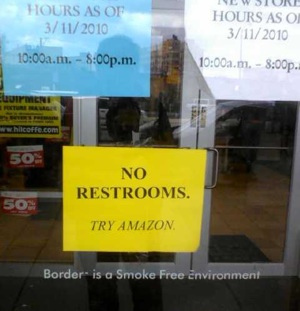 What have I learned about bookstore restrooms after all these years?
What have I learned about bookstore restrooms after all these years?
There are certain retail design rules, the primary one being that whenever possible, you should locate your public restroom in the back of the store, so customers have to pass by as many books as possible along the way.
And there are staff hierarchical considerations when the inevitable happens and the door of your bookstore's public restroom sports the always unwelcoming "Out of Order" sign, which can indicate a range of possible issues, from basic plumbing 101 to, well, let's just say... No, let's not.
I should confess that I took full advantage of reverse hierarchy when I worked as a frontline bookseller. Whenever a "bathroom issue" was brought to my attention that required more than restocking paper supplies, I kicked it upstairs to the highest-ranking person in the store at that moment, using the always effective argument: "We're really busy!" Since I happened to work in an indie with a large staff, I could get away with deferring. Most booksellers don't have that luxury.
Bookstore bathrooms can also be a shoplifter's best friend. During the late '90s, some kids (presumably) were stealing our CDs using the bathroom drop method. One muscially-inclined culprit stashed the plastic security encased discs in a cabinet under the sink, then an accomplice subsequently cracked them open and made a hasty exit. Once aware of the plot, our floor manager extracted the evidence from the cabinet and left a note: "We have your CDs on hold at the front desk. Please feel free to stop by anytime and ask for them." End of crime wave.
Maybe we should discuss all this. "Is Your Bookstore Bathroom Shoplifter-Proof?" Now that would be one hell of a BEA/ABA educational session. Or "Bookstore Restrooms: Too Clean for Your Own Good?" Or "Bookstore Bathrooms: There's No App for That."
I can already imagine BEA attendees asking for directions: "Where's the panel on bookstore restrooms?" And the inevitable response: "Room 1E07, second door on your left." --Published by Shelf Awaress, issue #2028.
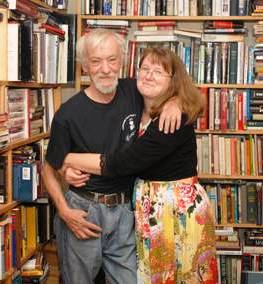 |
| Jack Beck and Wendy Welch |
Nearly a year ago, I wrote about the search for a bookshop-sitter launched by Wendy Welch and Jack Beck, co-owners of Tales of the Lonesome Pine bookshop, Big Stone Gap, Va. They needed somebody to keep an eye on the place while they toured for Wendy's new book, The Little Bookstore of Big Stone Gap: A Memoir of Friendship, Community and the Uncommon Pleasure of a Good Book (St. Martin's).
Ultimately, "the perfect" Andrew Whalen took the helm for a couple of months, but Wendy recently told me that among the 180-plus inquiries they received was one from Memphis, Tenn., residents Mark and Sally Smith, who "would have been our shopsitters (and nothing would have gone viral) if it hadn't been that they had a family function in the middle of the period when we needed them. They wrote their information in the voice of their granddog, whom they were babysitting. He recommended them highly."
This spring, the Smiths finally had their chance, watching the bookstore for two weeks while Jack and Wendy took "a good old-fashioned vacation.... When we got home, they had planted flowers in our empty beds and left a quart of fresh milk in the fridge. They are also perfect," Wendy said.
Now the Smiths have decided to offer their bookshop-sitting services to other indies. Their Tales of the Lonesome Pine experience "turned out to be the perfect way to indulge in our love of books, bookstores and travel without having to be tied down to a long-term situation," Mark recalled. "We had great fun. We met a lot of interesting people, some local and some passing through. It was wonderful to be surrounded by books all day while meeting people who wanted to talk about books."
There were challenges, of course, but "Wendy and Jack were liberal with their instructions on pricing so things went along without a hitch," Mark said. "We enjoyed the routine of sorting, finding out-of-order books and reshelving them, and just making things look neat. Oh yes, the flowers were an extra touch."
Mark retired three years ago after a career in the corporate world and Sally was a teacher. Both are volunteers at the Memphis Public Library, where Sally works in the retail portion of the bookstore and Mark in the sorting room. They met through the library's book club and have been married since 2007.
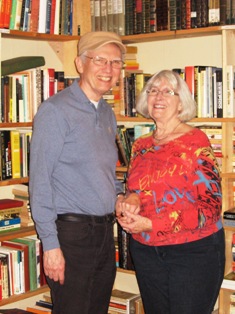 |
| Mark and Sally Smith |
Why do they want to expand their bookshop-sitting quest? "We had such fun meeting the people there in Big Stone Gap, and we were happy to help in a small way independent bookstore owners who needed to be away from the shop for a short time," Mark said. "The opportunity to visit new places and be there long enough to get the real feel of the place is a great opportunity. In short, we love books, love people and love to travel. Bookshop-sitting (Is that really a word?) fulfills all those things."
Of course bookshop-sitting is a real word, Mark. I should know. I was the one who made it up.
The big question, of course, is what sort of indie could use a bookshop-sitter? Wendy said her favorite "crazy bookstore" Facebook cover photo "suggests the atmosphere Mark and Sally walked into that just fit them. Our place is a social center, the books are easy to price and we live there. Mark and Sally had library sale experience but not bookstore itself, but that worked for us. Also, they loved animals and were outgoing--two big pluses to fit our ethos.
"From when the thing went viral last year and we got all those applications, the thing Jack and I noted right away was people who would fit in, in Big Stone Gap, and those who wouldn't. What do the bookshop-sitters think they're getting? That is way more important than anything else. It's like a tiny marriage; you have to have some empathy for how each other lives, or it's not going to work."
As far as the used versus new bookstore question is concerned, Wendy said it "depends on the bookshop-sitters themselves. I don't think Mark and Sally would've wanted to work a new store, given their experience levels, without some serious training. But they walked into our place, spent one day learning how to order books, triage books, and price them. And we walked out and they had the place as their own." She thought the ideal shop would probably have a small staff, be very community rooted and use systems that can be quickly learned. "Not everyone can step into an ethos and match it by talent; most have to match it by being of the same mind."
Do you need a bookshop-sitter? Contact Mark and Sally Smith at [email protected]. As Wendy observed, "They don't want money, just to have a good time and be appreciated. And believe me, they are easy to appreciate." --Published By Shelf Awareness, issue #2023.
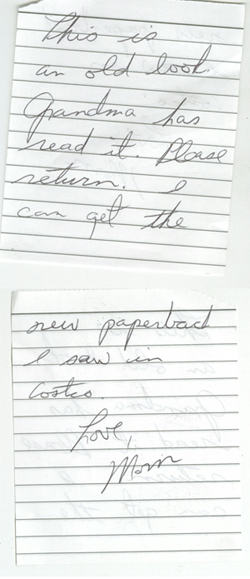
"This is an old book. Grandma has read it. Please return. I can get the new paperback I saw in Costco. Love, Mom."
One of the little pleasures of my reading life is receiving the B-Mail newsletter from Brookline Booksmith, Brookline, Mass. In each issue, there is a Used Book Cellar "Find of the Week." Sometimes the hastily scribbled notes are funny and sometimes poignant, but always irresistible. It's as if they weren't lost or abandoned at all, but finally discovered their true home and value between those pages.
Exegesis is also part of Brookline's Find of the Week ritual. Here's the commentary on Mom's Costco note above: "This makes my heart hurt. While you're there, we're almost out of mustard and Alaskan king crab spread. Get a gallon of each. And eight dozen bottles of sparkling cider. Unless they don't let you get just half the package, in which case go ahead and get sixteen-dozen. And twenty tubes of toothpaste. Please."
The casual and yet deeply personal handwriting in these scraps affects me as a reader because it is so human in a fragile, unintentionally revealing way that text messages ("pls give gram hr bk getting 14u @costco") or viral tweets can't possibly emulate.
Handwriting isn't a lost art, or at least not an art lost on me. When I visit a bookstore, I'm always drawn to shelf talkers that are handwritten. Even legibility is secondary to the enthusiasm invoked by a pen's scrawl across the surface of a card. I'm also on the lookout for those faded, handwritten, often outdated reminders that cling by frayed yellow tape to cash registers ("Use shift-F4 to...") or over staff break room sinks ("You're mother doesn't work here. Wash your own dishes!"). For pure entertainment, however, there's nothing quite like children's handwritten contributions to bookstore suggestion boxes ("Need more chairs for us kids!").
I'm not a handwriting purist, which is perhaps one reason the scraps intrigue me. Just in case you missed it, January 23 was National Handwriting Day, brought to you, not coincidentally, by the Writing Instrument Manufacturers Association, which represents the $4.5-billion industry of pen, pencil and marker manufacturers. Its purpose is to "alert the public to the importance of handwriting," offering "a chance for all of us to re-explore the purity and power of handwriting." Sorry you didn't get my handwritten greeting card.
Probably the reason I'm paying more attention lately is because I just finished reading Philip Hensher's The Missing Ink: The Lost Art of Handwriting, in which he observed: "Our attitude to our own handwriting is a peculiar mixture of shame and defiance: ashamed that it's so bad and untutored, but defiant in our belief that it's not our fault. What shame and defiance have in common, of course, is the determination to leave the cause of the shame and defiance unaltered."
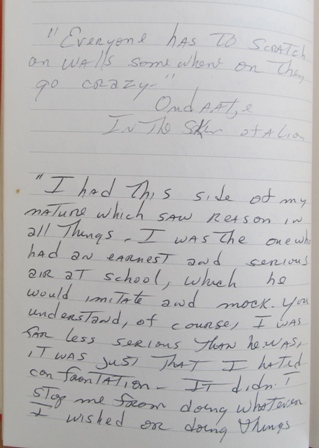 I get that. My own "hand" is deeply influenced by the slight childhood trauma of switching schools in the middle of first grade and having to adapt in mid-stream from print to cursive. The end result is a relatively legible, if visually jumbled collection of print and cursive letters lining up like mismatched train cars (judge for yourself in this example).
I get that. My own "hand" is deeply influenced by the slight childhood trauma of switching schools in the middle of first grade and having to adapt in mid-stream from print to cursive. The end result is a relatively legible, if visually jumbled collection of print and cursive letters lining up like mismatched train cars (judge for yourself in this example).
After I changed schools, my former teacher wrote a consoling note to my mother regarding little Robert's apparent struggle to adapt. She conceded that while "many schools do start writing in the first grade," most of the districts in the area didn't begin teaching cursive until third grade. It didn't get better from there. I hesitate to even mention the nuns. In sixth grade, Sister Philomena checked "N" on my report card under penmanship: "Needs help; is progressing but below grade level."
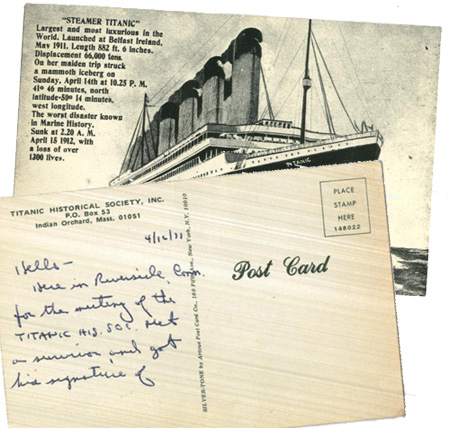 Thus, handwriting eventually became more of a spectator sport for me, and when I need a fix, Brookline Booksmith always delivers with treasures like this postcard: "Hello--Here in Riverside, Conn., for the meeting of the Titanic His. Soc. Met a survivor and got his signature..."
Thus, handwriting eventually became more of a spectator sport for me, and when I need a fix, Brookline Booksmith always delivers with treasures like this postcard: "Hello--Here in Riverside, Conn., for the meeting of the Titanic His. Soc. Met a survivor and got his signature..."
As I mentioned before, Brookline has a true gift for handwriting exegesis: "It concerns me that this message is abruptly cut off. Did anyone out there ever hear any word from attendees of the 1971 Titanic Historical Society reunion in Riverside, CT? From what I know of the original tragedy, it took some hours for the ship to go down, but I fear that whatever befell this postcard's author was rather more sudden. Perhaps the iceberg simply dropped upon the top of the building this time. That would explain it." Nicely played, Brookline. Couldn't have written it better myself.--Published by Shelf Awareness, issue #1933.
Shop local meets broadcast local. In the still center of that spinning wheel of digital retail chaos--e-mails, Tweets, Facebook updates, blog posts, Instagram pics--that is the contemporary bookseller's daily round of local outreach tasks, there's a certain comfort to be drawn from noting the success of an old-fashioned radio variety program created and hosted by Chuck and Dee Robinson, owners of Village Books, Bellingham, Wash.
 January marked the sixth anniversary of the Chuckanut Radio Hour. Taped before a live audience, the show generally features a guest author; what I've seen described as "some groaner jokes" by Chuck, Dee and announcer Rich Donelly; and an episode of "The Bellingham Bean" serial radio comedy. There is also live music, a new essay by Cascadia Weekly columnist Alan Rhodes, poetry by house poet Kevin Murphy and other bookish treats.
January marked the sixth anniversary of the Chuckanut Radio Hour. Taped before a live audience, the show generally features a guest author; what I've seen described as "some groaner jokes" by Chuck, Dee and announcer Rich Donelly; and an episode of "The Bellingham Bean" serial radio comedy. There is also live music, a new essay by Cascadia Weekly columnist Alan Rhodes, poetry by house poet Kevin Murphy and other bookish treats.
"The show is now broadcast on three low-power community radio stations," said Chuck. "KMRE is the one here in Bellingham and reaches the largest audience. The station can be streamed at any time, but we don't do the show live. CRH plays on the station every Saturday evening at 6 p.m. and every Sunday at 9 p.m. The shows play in rotation. We don't even know which show will play." With two other small stations in the area now featuring the program as well, "I guess that means we're syndicated," he quipped.
When Chuck was approached in 2007 about doing some sort of radio program, he drew inspiration and format ideas from Thacker Mountain Radio (Square Books, Oxford, Miss.) and Garrison Keillor's Prairie Home Companion.
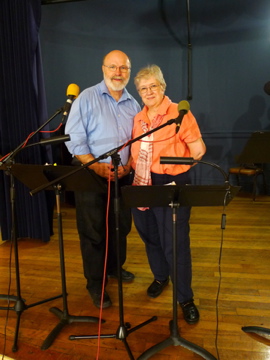 "I think part of the appeal is the reflection of a time we remember as simpler--whether it actually was or not (memory does strange things)," he observed. "Though folks my age--I just became a Medicare baby in November--were on the tail end of old-time radio, early television (Ed Sullivan, the Tonight Show, etc.) was really old-time radio on TV. So I think for a lot of us there's a bit of nostalgia involved. Some of us really do like corny jokes."
"I think part of the appeal is the reflection of a time we remember as simpler--whether it actually was or not (memory does strange things)," he observed. "Though folks my age--I just became a Medicare baby in November--were on the tail end of old-time radio, early television (Ed Sullivan, the Tonight Show, etc.) was really old-time radio on TV. So I think for a lot of us there's a bit of nostalgia involved. Some of us really do like corny jokes."
Since Village Books is also committed to outreach through social networking, Chuck considers CRH to be both a complement and a counterpoint to those efforts: "Our audience for the show, depending of course on what author is featured, trends slightly older than our general audience. To the extent that most of these folks don't likely spend much time on Twitter, the show is likely a counterpoint to what they see others doing. And, to those who do Tweet and Facebook, this might be providing a respite. We do use social media to promote the show and we often have comments, especially on Facebook, about particular shows."
Division of labor while maintaining consistency in a bookstore's "voice" is the eternal challenge for booksellers everywhere, but Chuck noted that Village Books has managed to bridge the outreach gaps well: "We have one person who manages our social media. Lindsey McGuirk is pretty attuned to the philosophy of the store and also seems to have a great understanding of the 'conversational' nature of social media and how it can be used to build relationships. She does a great job of balancing marketing, with providing interesting general information, to having conversations with folks and asking questions. Other staff members have their own blogs and often guest blog on our site."
Who attends CRH performances? While the live audience tends to be in the 45-50 age range, Chuck said that can change depending upon the guest author for a particular show: "T.C. Boyle drew a bit younger audience, as did Cheryl Strayed, but I think for the most part that the radio hour format appeals more to an older audience. We are, however, about to test that notion as we move the show to an auditorium at Whatcom Community College in March. We'll be integrating some faculty, staff and students into the programming, and in our partnership agreement, they'll be able to attend for free."
He noted that one of the more surprising revelations about the show's audience occurs whenever he asks how many are seeing CRH for the first time and a considerable number of hands go up. "We thought after 60-plus shows we would have tapped the local audience, but apparently not."
Happy anniversary, CRH. As Chuck summed it up so well in a recent blog post, "Whoda thunk it? Six years and the Chuckanut Radio Hour is still going strong."--Published by Shelf Awareness, issue #1929.
People fall in love with books. People fall in love with bookstores. People fall in love with other people in bookstores. People even fall in love with booksellers.
"With Valentine's Day around the corner, this is the question that is naturally on every book lover's mind: When I go into my local bookstore, am I allowed to start flirting with the staff?" Sarah Rettger wrote on her blog Archimedes Forgets. Her entertaining reply included this pointed summary: "Short version: Of course!... Longer version: As long as you're not stupid about it."
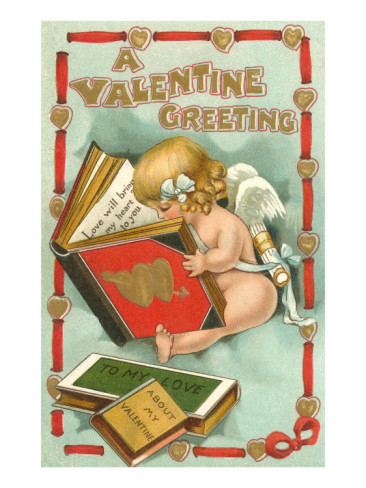 When I consider Valentine's Day, which is even now circling to land with its stubby Cupid wings, I can't help but think of books. It's just my nature. I love books. I love bookstores. I even fell in love with my wife in a bookstore. For the record, she was also a bookseller at the time.
When I consider Valentine's Day, which is even now circling to land with its stubby Cupid wings, I can't help but think of books. It's just my nature. I love books. I love bookstores. I even fell in love with my wife in a bookstore. For the record, she was also a bookseller at the time.
Forget greeting cards and roses and candy (Well, don't forget them. Booksellers love sideline sales, too). Giving the right books as gifts may be the real key to long-term commitment between readers. And Valentine's Day can turn even the most cynical bookseller into a relationship counselor, especially for those last minute "oh no I almost forgot" shoppers.
During the past week, I've been monitoring bookstore love notes in the form of e-newsletters. Here's just a tiny sampling of the indie love happening out there as the big day approaches:
Brookline Booksmith, Brookline, Mass.: "Folks, let's talk about something serious for a minute. I'm going to get right to it. In order for you to give flowers to your sweetie on Valentine's Day.... you first have to kill the flowers. Sever them in the prime of their brief, radiant life. Or worse, hire some mercenary floral assassin to do the dirty work for you. What sort of monster have you become? You'll never be able to wash their chlorophyll off your hands. Need an alternative to veg-icide? Why not save the roses and give your loved one the gift of reading?"
Common Good Books, St. Paul, Minn.:
Dear Reader,
How do we love thee? Let us count the ways:
1. Inspired Events!
2. Celebrated Books!
3. Chocolate!
Alright, look, so I can't promise you chocolate. But the coffee shop's next door.
Greenlight Bookstore, Brooklyn, N.Y.: "We're not doing any official Valentine's Day events at Greenlight this year--but in a way, every event is our way of saying we love you. This month we've got electrifying poetry, moving and original fiction, vegan cookery (with tasty samples!), top drawer comedy and a celebration of Black History Month. What's not to love?"
Titcomb's Bookshop, East Sandwich, Mass.: "Do you remember the first book you read that made you fall in love with reading? The one that whisked you away to a foreign land or time, made you swoon, had you laughing or crying out loud, or changed your opinion.... The instant someone recommends a book that falls outside your comfort zone, and you accept the challenge to read it, that is when you know you have fallen in love with books. We invite you to share your love story with books on our Facebook page. How did your story begin? Maybe you can inspire others to fall in love with a book!"
I'd already decided to write about Valentine's Day when a package arrived from BooksActually, an indie bookstore I love (though, regrettably, have never visited) in Singapore. I wrote about this wonderful bookshop some time ago and have remained in contact.
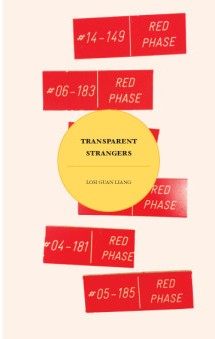 Occasionally, BooksActually sends me recent titles published by their Math Paper Press. These books, currently not distributed in the U.S., are beautifully designed and have opened up a new literary world to me as a reader. The latest gift box included Transparent Strangers by Loh Guan Liang, whose poem "Dancing in the Bookstore" ends with the following lines, which seem to perfectly complement a holiday celebrating love and--for all of us--the irresistible, seductive power of words:
Occasionally, BooksActually sends me recent titles published by their Math Paper Press. These books, currently not distributed in the U.S., are beautifully designed and have opened up a new literary world to me as a reader. The latest gift box included Transparent Strangers by Loh Guan Liang, whose poem "Dancing in the Bookstore" ends with the following lines, which seem to perfectly complement a holiday celebrating love and--for all of us--the irresistible, seductive power of words:
How this gathering has become
a communal feasting of glances, books
changing hands, magazines flipping,
jumping, exchanging partners
as they twirl us round the shelves.
Take this waltz, this everyday waltz
with its narrow waist in your hand.
Happy Valentine's Day, book people.--Published by Shelf Awareness, issue #1924.
Have you seen any good books on television lately? I know. Books are on TV all the time as adaptations, serializations or, in the eyes of many viewers, ruinations. If golf is a good walk spoiled, then TV shows swiped from the printed page can often be a good read spoiled.
There is, however, a network where books do not go to die. Every weekend, C-SPAN 2's Book TV dedicates 48 hours of programming to author interviews, panel discussions, book fairs, book signings, author readings and bookstore tours around the U.S. It may be as close as the book world can, or would want to, get to reality TV.
On Wednesdays, part of my job is to scroll through Book TV's upcoming schedule, compiling a list of programs that might be of interest to Shelf Awareness readers. And every Thursday morning, we feature a "This Weekend on Book TV" section. Imagine that: a network where books matter. Even as I wrote this column yesterday, Gen. Stanley McChrystal (Ret.) was being interviewed live at the Free Library of Philadelphia about My Share of the Task: A Memoir.
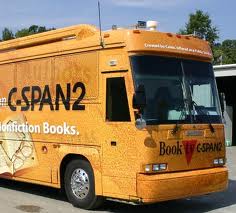 C-SPAN and the book world have a long and mutually beneficial relationship. That iconic C-SPAN bus gets one of the best parking spots in New York City every year, inside the Javits Center near the entrance to BookExpo America. I pass by several times each day (and have the tote bags to prove it). I also watch Book TV programming regularly, and am particularly fond, for obvious reasons, of the featured bookstore events, like Saturday's visit to Santa Fe, N.Mex., where a stop at Collected Works Bookstore is on the itinerary.
C-SPAN and the book world have a long and mutually beneficial relationship. That iconic C-SPAN bus gets one of the best parking spots in New York City every year, inside the Javits Center near the entrance to BookExpo America. I pass by several times each day (and have the tote bags to prove it). I also watch Book TV programming regularly, and am particularly fond, for obvious reasons, of the featured bookstore events, like Saturday's visit to Santa Fe, N.Mex., where a stop at Collected Works Bookstore is on the itinerary.
It's always fun to get a "behind the scenes," or at least on the scene, peek at some great indie bookstores nationwide. Popular Book TV venues include Politics & Prose, Washington, D.C. (home field advantage); Changing Hands Bookstore, Tempe Ariz.; Harvard Book Store, Cambridge, Mass.; and Tattered Cover Book Store, Denver, Colo., but dozens of indies regularly get their moments on camera.
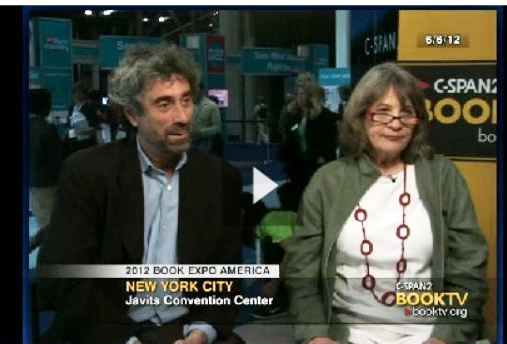 One thing I've noticed is that both C-SPAN and the indies have become more media sophisticated over the years, compared to early efforts during the 1990s when the bookshop where I worked would sometimes be a site for filming events. Production values were a bit shakier then, and the cameras tended to roll longer before and after a reading than perhaps was wise.
One thing I've noticed is that both C-SPAN and the indies have become more media sophisticated over the years, compared to early efforts during the 1990s when the bookshop where I worked would sometimes be a site for filming events. Production values were a bit shakier then, and the cameras tended to roll longer before and after a reading than perhaps was wise.
At the first C-SPAN event we hosted, for example, the last thing viewers saw was one of my fellow booksellers and her son making their exit from the back row by trying to sneak under the camera. Unfortunately, they tripped over each other instead, adding an unintended action sequence to the otherwise civilized episode.
Book TV is in a way the second-generation effort for the network, since C-SPAN's book genealogy really began with Booknotes, which ran from 1989 to 2004 and was hosted by the network's founder and CEO Brian Lamb, whose dry but direct interview style I found absolutely irresistible. Watching Lamb was like seeing a book version of Dragnet. His "just the facts, ma'am" style seemed to go against everything television stood for, and yet it worked precisely as he intended, keeping the spotlight on the writer being interviewed.
Mark Edmundson, author of Why Read, was the guest for the final episode of Booknotes. Inevitably, Lamb's first question was: "Why read?" He never shied away from asking for seemingly obvious information--the kind of clarification most of us wouldn't dare admit we didn't already know--as shown in this rapid fire sequence:
How often do you read something that you totally disagree with?
Give us an example.
What's a nihilist?
Where's that term come from?
On C-SPAN, reading and television find common ground. Consider the question Lamb asked Shelby Foote in 2001: "What is it about the written word that's either attractive to people or separates it from television?"
Foote's reply: "I really think that the written word is what defines us as superior creatures to all the other creatures on earth. Man is characterized by a number of things. One of them is he's the only animal that knows he's going to die some day. And knowing that, he also has an obligation to make the most of whatever time he has. And making the most of it is enormously assisted by reading, by learning about the world." Now that's great book TV.--Published by Shelf Awareness, issue #1919.
My desk is too neat. I've seen many other book trade people's desks over the years. Most glory in an organized--"I know where to find what I need"--chaos of paper, ARCs, mail (opened, half-opened and unopened) and other necessary detritus, ranging from science project coffee mugs to inkless pens.
 But my desk? Barren.
But my desk? Barren.
I'm certainly not lacking for material to correct the situation. There's a large room downstairs, furnished with packed bookshelves, and the volume of incoming ARCs and comp copies never slackens. My desktop, however, remains unnervingly pristine.
Whether you're a bookseller, writer or publisher, you probably log a majority of your workday in Deskland. Even frontline booksellers, who spend hours on their feet, are also tied umbilically to sales floor information desks or POS counters (which are really just high desks cluttered with impulse-buy items).
One of Garrison Keillor's writing desks used to be on the sales floor at the old Cathedral Hill location of Common Good Books, St. Paul, Minn. And when he led a media tour of the new store last year, Keillor said: "I don't know where I'll hang out--I'll need a desk."
In Christopher Morley's The Haunted Bookshop, proprietor Roger Mifflin is introduced sitting "tilted back in a swivel chair, in a corner which seemed the nerve center of the establishment. The large pigeon-holed desk in front of him was piled high with volumes of all sorts, with tins of tobacco and newspaper clippings and letters. An antiquated typewriter, looking something like a harpsichord, was half-buried in sheets of manuscript."
Desks matter.
That's why I'm worried about my desk. I consulted an expert on the subject for perspective. Valerie Kohler owns Blue Willow Bookshop, Houston, Tex., and her store blog's name is More Letters from the Messy Desk.
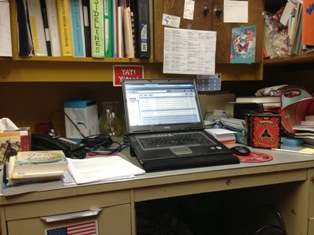 "My messy desk probably looks like most," she observed. "Our backroom is only 200 square feet and that includes the tiny restroom. Most people can't believe that we have three computers back here and at any time four-plus people might be working here. So there is no privacy and lots of interruptions. But we remain friends. My desk is vintage 1970s, which means it's not ergonomically correct and the drawers except for the one file drawer are pretty useless."
"My messy desk probably looks like most," she observed. "Our backroom is only 200 square feet and that includes the tiny restroom. Most people can't believe that we have three computers back here and at any time four-plus people might be working here. So there is no privacy and lots of interruptions. But we remain friends. My desk is vintage 1970s, which means it's not ergonomically correct and the drawers except for the one file drawer are pretty useless."
As of yesterday morning, she said her desk's inventory included:
- A few ARCs that I really want to read
- Two applications from some very qualified people whom I don't have room for
- At least 12 catalogues dropped off by reps that haven't made it to the catalogue shelf (Thanks to Edelweiss, I can keep this one tidy.)
- My lunch bag
- Some pretty Blue Willow pottery that a book club gave me. What am I going to do with it?
- Gobs of scratch paper
- A small Rolodex (Again, thanks to computers, I don't need two big ones like I used to have.)
- Lotion
- About six inches of paper that I need to deal with, including a Kobo order, a co-op clarification, notes from our World Book Night Committee meeting and a cool idea I printed from a tweet for our summer reading challenge.
- My paper calendar, which is my life support
- Two magnetic poetry boxes (???)
- A broken mouse
- Photos of my boys when they were young in swimming trunks with blue tongues; of my husband and I with lots of hair and no gray; and a great picture of my parents with me at the MPIBA show I attended.
- My water bottle
Valerie called her desk "command central and I love it when I see the gray metal on the bottom. This is where I read e-mails, send the Messy Desk letter, take phone calls and I love every minute!"
Should I mess up my desk?
Research doesn't help. For every study that finds a "messy desk can actually lead people towards clearer thinking," there's another countering that "office clutter undermines productivity and motivation."
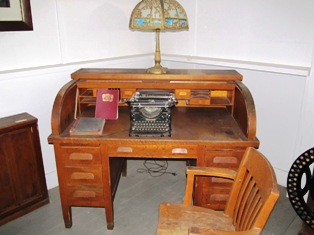 Earlier this week, I visited a museum showcasing items from a now-defunct marble company. It occurred to me that the old desk on display in a mock office looked as sparse as mine does now. And yet, that desk was much too weatherbeaten to have been so neat when it was in daily use during the first half of the 20th century.
Earlier this week, I visited a museum showcasing items from a now-defunct marble company. It occurred to me that the old desk on display in a mock office looked as sparse as mine does now. And yet, that desk was much too weatherbeaten to have been so neat when it was in daily use during the first half of the 20th century.
I probably can't alter my ways, but I did just put an ARC on the desk. It's lying there now, bugging me. I want to shelve it, but I won't just yet. Every journey begins with a single step, they say, and perhaps every messy desk begins with a single, unshelved ARC.--Published by Shelf Awareness, issue #1914.
View Next 25 Posts
 "Whether deals like this harm UC Davis Stores sales is an open question and, now, an ongoing experiment," a Forbes article headlined "Amazon Attacking Barnes & Noble On Campus?" noted. "Less immediately clear is if such a deal will put a dent in one of Barnes & Noble's healthiest businesses. In 2013, the college bookstore segment showed modest 1.1% growth while both the company's other divisions shrank."
"Whether deals like this harm UC Davis Stores sales is an open question and, now, an ongoing experiment," a Forbes article headlined "Amazon Attacking Barnes & Noble On Campus?" noted. "Less immediately clear is if such a deal will put a dent in one of Barnes & Noble's healthiest businesses. In 2013, the college bookstore segment showed modest 1.1% growth while both the company's other divisions shrank." 




 Cool bookstore road trip: Roxanne Coady, owner of
Cool bookstore road trip: Roxanne Coady, owner of  What remains of art & of books: In 1999, BookExpo was held in Los Angeles and we arrived a day early so we could see "Van Gogh's Van Goghs" at the L.A. County Museum of Art. I was the remainder buyer for the Northshire Bookstore then, and perhaps can lay blame on that extraordinary--once in a (my, at least) lifetime--exhibition for "inspiring" me to purchase, a few years later at CIROBE in Chicago, nearly 1,000 remaindered hardcover copies of Frederic Tuten's Van Gogh's Bad Café at a cool 25 cents each.
What remains of art & of books: In 1999, BookExpo was held in Los Angeles and we arrived a day early so we could see "Van Gogh's Van Goghs" at the L.A. County Museum of Art. I was the remainder buyer for the Northshire Bookstore then, and perhaps can lay blame on that extraordinary--once in a (my, at least) lifetime--exhibition for "inspiring" me to purchase, a few years later at CIROBE in Chicago, nearly 1,000 remaindered hardcover copies of Frederic Tuten's Van Gogh's Bad Café at a cool 25 cents each.

 Hope you've stopped worrying. I can't. There are weeks when even the most optimistic toilers in the field of bookselling have their "The universe is expanding.... What's the point?" moments. In Woody Allen's 1977 film Annie Hall, after young Alvy Singer's mother scolds him ("
Hope you've stopped worrying. I can't. There are weeks when even the most optimistic toilers in the field of bookselling have their "The universe is expanding.... What's the point?" moments. In Woody Allen's 1977 film Annie Hall, after young Alvy Singer's mother scolds him (" And just when I was thinking print books might be a refuge for now from this one aspect of digital nation's manifest destiny, I read in Time about the intriguing limited edition of Chang-rae Lee's new novel On Such a Full Sea, which "
And just when I was thinking print books might be a refuge for now from this one aspect of digital nation's manifest destiny, I read in Time about the intriguing limited edition of Chang-rae Lee's new novel On Such a Full Sea, which " Out with the old and in with the new is the prevailing cultural myth, though author
Out with the old and in with the new is the prevailing cultural myth, though author  On Christmas Eve, sometime during the late afternoon in most indie bookstores, one final customer will arrive at the checkout counter with an armload of stuff, and a bookseller or two will accept the challenge of wrapping these almost ceremonial purchases. The gift paper choices at that point may be limited; of the three or four or six rolls on display, a couple will no doubt be simple cardboard memorials to Christmas wrap options past.
On Christmas Eve, sometime during the late afternoon in most indie bookstores, one final customer will arrive at the checkout counter with an armload of stuff, and a bookseller or two will accept the challenge of wrapping these almost ceremonial purchases. The gift paper choices at that point may be limited; of the three or four or six rolls on display, a couple will no doubt be simple cardboard memorials to Christmas wrap options past.  The Australian Booksellers Association has been using the peculiar trials inherent in gift wrapping as a book-selling promotion this year with a series of posters, including "
The Australian Booksellers Association has been using the peculiar trials inherent in gift wrapping as a book-selling promotion this year with a series of posters, including " Colin Wilson, who died December 5 at the age of 82, wrote these words in his novel The Philosopher's Stone, first published in 1969 and a book I never considered handselling when I was a bookseller, even though I first read it nearly 40 years ago and have had a copy somewhere on my shelves ever since. Curious.
Colin Wilson, who died December 5 at the age of 82, wrote these words in his novel The Philosopher's Stone, first published in 1969 and a book I never considered handselling when I was a bookseller, even though I first read it nearly 40 years ago and have had a copy somewhere on my shelves ever since. Curious. So the Philosopher's Stone has stayed with me, weaving that spell certain books cast, as most readers will understand. "Through books, man has conquered time," Wilson wrote. "The insights of poets and saints are still alive. For two million years, man ascended the evolutionary ladder slowly and painfully, changing hardly more than an ape of the horse. With the invention of books, he took a giant step into the realm of the gods."
So the Philosopher's Stone has stayed with me, weaving that spell certain books cast, as most readers will understand. "Through books, man has conquered time," Wilson wrote. "The insights of poets and saints are still alive. For two million years, man ascended the evolutionary ladder slowly and painfully, changing hardly more than an ape of the horse. With the invention of books, he took a giant step into the realm of the gods." What are the odds you'll be wrong? You know the answer to that one. And yet we keep going back to the book trade window to bet again as we write, publish and market more books, always hoping for the elusive, irresistible combination of luck and performance that makes for a winner, however you might define the term.
What are the odds you'll be wrong? You know the answer to that one. And yet we keep going back to the book trade window to bet again as we write, publish and market more books, always hoping for the elusive, irresistible combination of luck and performance that makes for a winner, however you might define the term.  Mark Kaufman and Donna Paz Kaufman run the Bookstore Training and Consulting Group of
Mark Kaufman and Donna Paz Kaufman run the Bookstore Training and Consulting Group of  "Even 20 years ago, there was room to launch a bookstore and financially do well without constant worry about cash flow," she recalled. "Retail bookselling today is more of a challenge, requires more creativity and demands many more skills than it used to. We encourage people to consider ways they'll be unique and how they'll become the 'go-to' place in their community for people who love to read. Why not add a little extra to bump up the average sale, especially when you see customers laugh and have a good time finding things in your store? Each combination will be unique, and there is a wide range of general merchandise categories, services, learning opportunities, and food and beverages to help create that special store."
"Even 20 years ago, there was room to launch a bookstore and financially do well without constant worry about cash flow," she recalled. "Retail bookselling today is more of a challenge, requires more creativity and demands many more skills than it used to. We encourage people to consider ways they'll be unique and how they'll become the 'go-to' place in their community for people who love to read. Why not add a little extra to bump up the average sale, especially when you see customers laugh and have a good time finding things in your store? Each combination will be unique, and there is a wide range of general merchandise categories, services, learning opportunities, and food and beverages to help create that special store."  She added that when the big box chains "are selling cheap, imported goods, many hunger for unique, handmade, locally crafted, quality items. Booksellers don't have to sell out or feel compromised. It's smart retailing to keep the selection fresh and exciting, filling niches and seizing opportunities. It's time we focus on serving our target markets (people) instead of being focused purely on our product (books). We are so fortunate to have target markets that value education, have disposable income and understand the importance of local business to sustainable communities. We should be obsessed with catering to their intellectual, spiritual and aspirational needs. A dynamic and lively selection will help us remain interesting, relevant and profitable."
She added that when the big box chains "are selling cheap, imported goods, many hunger for unique, handmade, locally crafted, quality items. Booksellers don't have to sell out or feel compromised. It's smart retailing to keep the selection fresh and exciting, filling niches and seizing opportunities. It's time we focus on serving our target markets (people) instead of being focused purely on our product (books). We are so fortunate to have target markets that value education, have disposable income and understand the importance of local business to sustainable communities. We should be obsessed with catering to their intellectual, spiritual and aspirational needs. A dynamic and lively selection will help us remain interesting, relevant and profitable."  "We try to listen and watch for what there is a need for in our town, staying away from competing with the few other retail shops that are open," wrote Annie Leonard, manager of the
"We try to listen and watch for what there is a need for in our town, staying away from competing with the few other retail shops that are open," wrote Annie Leonard, manager of the 
 Listening to their customers and monitoring sales numbers closely, the shop has adapted over the years, refining its book selection and expanding women's accessories. After the local Hallmark store closed in 2010, the Next Chapter brought in greeting cards; and a year later, when the local home and garden décor shop closed, the bookstore took over an adjacent empty suite of offices and expanded its inventory to fill another retail void in the town.
Listening to their customers and monitoring sales numbers closely, the shop has adapted over the years, refining its book selection and expanding women's accessories. After the local Hallmark store closed in 2010, the Next Chapter brought in greeting cards; and a year later, when the local home and garden décor shop closed, the bookstore took over an adjacent empty suite of offices and expanded its inventory to fill another retail void in the town. Asked about the decision to call the store a "Gift & Book Boutique," Leonard explained: "Several years ago, a lovely out of town shopper stopped in, shopped the whole place thoroughly, and as she walked out said, 'This isn't just a book shop, it's a book boutique!' We loved the expression, and have adopted it as our tag line. Then, as we expanded and shifted our focus a bit, we commissioned a new logo that more accurately reflected what we are, and since we liked the sound of 'book boutique' we added the word 'gift' first to keep the last two words together. I suppose you could say it was a marketing strategy. We think it sounds good in our many radio ads."
Asked about the decision to call the store a "Gift & Book Boutique," Leonard explained: "Several years ago, a lovely out of town shopper stopped in, shopped the whole place thoroughly, and as she walked out said, 'This isn't just a book shop, it's a book boutique!' We loved the expression, and have adopted it as our tag line. Then, as we expanded and shifted our focus a bit, we commissioned a new logo that more accurately reflected what we are, and since we liked the sound of 'book boutique' we added the word 'gift' first to keep the last two words together. I suppose you could say it was a marketing strategy. We think it sounds good in our many radio ads." Although books are still the primary focus, narrow profit margins mean they "cannot stand alone," Leonard said. "We have learned to be really smart and selective about what books we carry, and how many of them we can keep in stock. That's been a hard lesson at times, but in the end, I still get to find great books for my customers, and that is tremendously rewarding. Further, I've also learned that picking out beautiful scarves, luxe journals and fun wall hangings is lots of fun, too, and helping our customers find just the right gift or home accent is also very rewarding. In the end, it's about staying in business, being fulfilled and meeting the needs of our community, not necessarily about how many shelf-feet of books we stock."
Although books are still the primary focus, narrow profit margins mean they "cannot stand alone," Leonard said. "We have learned to be really smart and selective about what books we carry, and how many of them we can keep in stock. That's been a hard lesson at times, but in the end, I still get to find great books for my customers, and that is tremendously rewarding. Further, I've also learned that picking out beautiful scarves, luxe journals and fun wall hangings is lots of fun, too, and helping our customers find just the right gift or home accent is also very rewarding. In the end, it's about staying in business, being fulfilled and meeting the needs of our community, not necessarily about how many shelf-feet of books we stock."


 Shopkeepers have not traditionally garnered such high praise. Adam Smith sounded a little snarky in the 18th century: "To found a great empire for the sole purpose of raising up a people of customers, may at first sight, appear a project fit only for a nation of shopkeepers. It is, however, a project altogether unfit for a nation of shopkeepers, but extremely fit for a nation whose government is influenced by shopkeepers."
Shopkeepers have not traditionally garnered such high praise. Adam Smith sounded a little snarky in the 18th century: "To found a great empire for the sole purpose of raising up a people of customers, may at first sight, appear a project fit only for a nation of shopkeepers. It is, however, a project altogether unfit for a nation of shopkeepers, but extremely fit for a nation whose government is influenced by shopkeepers."

 Four Aussie publishers produced free mini-editions for booksellers to distribute to their patrons: Amazing Experiences (Lonely Planet), Rain Queen by Katherine Scholes (Penguin), The Dig Tree by Sarah Murgatroyd (Text), Secret Kingdom Activity Book and Sea Question Activity Book (both from Hachette).
Four Aussie publishers produced free mini-editions for booksellers to distribute to their patrons: Amazing Experiences (Lonely Planet), Rain Queen by Katherine Scholes (Penguin), The Dig Tree by Sarah Murgatroyd (Text), Secret Kingdom Activity Book and Sea Question Activity Book (both from Hachette). Australian indie booksellers are participating in numerous ways, some of which could easily be in the running as future Shelf Awareness "Cool Idea of the Day" features. Here's a sampling:
Australian indie booksellers are participating in numerous ways, some of which could easily be in the running as future Shelf Awareness "Cool Idea of the Day" features. Here's a sampling: So, happy National Bookshop Day! The ABA's
So, happy National Bookshop Day! The ABA's  On Monday, the
On Monday, the  I stopped by last Friday to check out the work-in-progress as opening deadline loomed. Shelving of new books was just getting underway, carpeting was still being installed and fixtures completed. Booksellers and construction workers rushed around, dodging each other as they balanced books, boards and cans of paint.
I stopped by last Friday to check out the work-in-progress as opening deadline loomed. Shelving of new books was just getting underway, carpeting was still being installed and fixtures completed. Booksellers and construction workers rushed around, dodging each other as they balanced books, boards and cans of paint. as her staff unpacked, received and organized books in sections temporarily labeled with colored tape; and co-owner Chris Morrow, who was supervising the hectic final rush to get the construction finished, among a hundred other details major and minor.
as her staff unpacked, received and organized books in sections temporarily labeled with colored tape; and co-owner Chris Morrow, who was supervising the hectic final rush to get the construction finished, among a hundred other details major and minor. In an e-mail newsletter I received yesterday proclaiming Saratoga as "our second home," the Morrow family said they were "thrilled to be part of this wonderful welcoming community, much as we have been a part of Manchester all these many years. We look forward to hearing from you, what your expectations are, what you like, what is missing, how we can become your bookstore.... We look forward to seeing you in both of our stores and offer our gratitude to all of you for supporting independent book selling."
In an e-mail newsletter I received yesterday proclaiming Saratoga as "our second home," the Morrow family said they were "thrilled to be part of this wonderful welcoming community, much as we have been a part of Manchester all these many years. We look forward to hearing from you, what your expectations are, what you like, what is missing, how we can become your bookstore.... We look forward to seeing you in both of our stores and offer our gratitude to all of you for supporting independent book selling." What will happen next? That's what every reader wants to know about each story they encounter, isn't it? When Northshire Bookstore Saratoga debuts Monday, it will be a soft opening in name only because the staff will be off to the races. This is high season for Saratoga, and downtown is packed with visitors from dawn to midnight and beyond every day.
What will happen next? That's what every reader wants to know about each story they encounter, isn't it? When Northshire Bookstore Saratoga debuts Monday, it will be a soft opening in name only because the staff will be off to the races. This is high season for Saratoga, and downtown is packed with visitors from dawn to midnight and beyond every day.  This applies to far more than just scholarly work or the Borgesian virtual library Google is building. I'm absolutely fascinated by the vast depths of historical information about the book trade now accessible through the archives of publications like the New York Times and Harper's.
This applies to far more than just scholarly work or the Borgesian virtual library Google is building. I'm absolutely fascinated by the vast depths of historical information about the book trade now accessible through the archives of publications like the New York Times and Harper's.  May 16, 1912: The New York Times featured
May 16, 1912: The New York Times featured  Straightforward timelines are, by comparison, much more comforting. Picture Rod Taylor in the 1960 film version of The Time Machine. Emotionally and philosophically dyspeptic after a frustrating New Year's Eve dinner with doubting friends, he sits in his invention, an elegant Victorian time sled. He reaches for a crystal knob and pushes "the lever forward ever so slightly."
Straightforward timelines are, by comparison, much more comforting. Picture Rod Taylor in the 1960 film version of The Time Machine. Emotionally and philosophically dyspeptic after a frustrating New Year's Eve dinner with doubting friends, he sits in his invention, an elegant Victorian time sled. He reaches for a crystal knob and pushes "the lever forward ever so slightly."  Then I recalled a scene in
Then I recalled a scene in  I've been a little haunted by this handsellers' time capsule ever since, and a couple of days ago, I tore off the bookseller pages and spread them out in front of me like tarot cards. I was reading the past, however, not the future, thinking about bookstores now closed (A Clean, Well-Lighted Place for Books) and still open (Hicklebee's); thinking about great booksellers like
I've been a little haunted by this handsellers' time capsule ever since, and a couple of days ago, I tore off the bookseller pages and spread them out in front of me like tarot cards. I was reading the past, however, not the future, thinking about bookstores now closed (A Clean, Well-Lighted Place for Books) and still open (Hicklebee's); thinking about great booksellers like  "Inspiration" was a word that came to mind; "legacy" another. More than calendar pages, more than a time capsule, these page-a-day shelf talkers seemed like buried treasure unearthed, and worth sharing:
"Inspiration" was a word that came to mind; "legacy" another. More than calendar pages, more than a time capsule, these page-a-day shelf talkers seemed like buried treasure unearthed, and worth sharing: While we're celebrating our big independence win over England 237 years ago, the United Kingdom isn't holding a candlelight vigil this week, mourning colonies found and lost. Instead, they are in the midst of
While we're celebrating our big independence win over England 237 years ago, the United Kingdom isn't holding a candlelight vigil this week, mourning colonies found and lost. Instead, they are in the midst of  "We should be saying we as a society think bookshops matter," said Mosse. "It is a statement of who we think we are as a society. It is not about value for money all the time--we do not have to go along with that. I do not think there is a single person in this room that hasn't bought a book from Amazon, but reading books and buying from stores matters more than that. We should have the courage to say 'free' isn't everything."
"We should be saying we as a society think bookshops matter," said Mosse. "It is a statement of who we think we are as a society. It is not about value for money all the time--we do not have to go along with that. I do not think there is a single person in this room that hasn't bought a book from Amazon, but reading books and buying from stores matters more than that. We should have the courage to say 'free' isn't everything."
 What have I learned about bookstore restrooms after all these years?
What have I learned about bookstore restrooms after all these years? 


 I get that. My own "hand" is deeply influenced by the slight childhood trauma of switching schools in the middle of first grade and having to adapt in mid-stream from print to cursive. The end result is a relatively legible, if visually jumbled collection of print and cursive letters lining up like mismatched train cars (judge for yourself in this example).
I get that. My own "hand" is deeply influenced by the slight childhood trauma of switching schools in the middle of first grade and having to adapt in mid-stream from print to cursive. The end result is a relatively legible, if visually jumbled collection of print and cursive letters lining up like mismatched train cars (judge for yourself in this example).  Thus, handwriting eventually became more of a spectator sport for me, and when I need a fix, Brookline Booksmith always delivers with treasures like this postcard: "Hello--Here in Riverside, Conn., for the meeting of the Titanic His. Soc. Met a survivor and got his signature..."
Thus, handwriting eventually became more of a spectator sport for me, and when I need a fix, Brookline Booksmith always delivers with treasures like this postcard: "Hello--Here in Riverside, Conn., for the meeting of the Titanic His. Soc. Met a survivor and got his signature..." January marked the sixth anniversary of the
January marked the sixth anniversary of the  "I think part of the appeal is the reflection of a time we remember as simpler--whether it actually was or not (memory does strange things)," he observed. "Though folks my age--I just became a Medicare baby in November--were on the tail end of old-time radio, early television (Ed Sullivan, the Tonight Show, etc.) was really old-time radio on TV. So I think for a lot of us there's a bit of nostalgia involved. Some of us really do like corny jokes."
"I think part of the appeal is the reflection of a time we remember as simpler--whether it actually was or not (memory does strange things)," he observed. "Though folks my age--I just became a Medicare baby in November--were on the tail end of old-time radio, early television (Ed Sullivan, the Tonight Show, etc.) was really old-time radio on TV. So I think for a lot of us there's a bit of nostalgia involved. Some of us really do like corny jokes." When I consider Valentine's Day, which is even now circling to land with its stubby Cupid wings, I can't help but think of books. It's just my nature. I love books. I love bookstores. I even fell in love with my wife in a bookstore. For the record, she was also a bookseller at the time.
When I consider Valentine's Day, which is even now circling to land with its stubby Cupid wings, I can't help but think of books. It's just my nature. I love books. I love bookstores. I even fell in love with my wife in a bookstore. For the record, she was also a bookseller at the time.  Occasionally, BooksActually sends me recent titles published by their
Occasionally, BooksActually sends me recent titles published by their  C-SPAN and the book world have a long and mutually beneficial relationship. That iconic C-SPAN bus gets one of the best parking spots in New York City every year, inside the Javits Center near the entrance to BookExpo America. I pass by several times each day (and have the tote bags to prove it). I also watch Book TV programming regularly, and am particularly fond, for obvious reasons, of the featured bookstore events, like Saturday's
C-SPAN and the book world have a long and mutually beneficial relationship. That iconic C-SPAN bus gets one of the best parking spots in New York City every year, inside the Javits Center near the entrance to BookExpo America. I pass by several times each day (and have the tote bags to prove it). I also watch Book TV programming regularly, and am particularly fond, for obvious reasons, of the featured bookstore events, like Saturday's 
 But my desk? Barren.
But my desk? Barren.  "My messy desk probably looks like most," she observed. "Our backroom is only 200 square feet and that includes the tiny restroom. Most people can't believe that we have three computers back here and at any time four-plus people might be working here. So there is no privacy and lots of interruptions. But we remain friends. My desk is vintage 1970s, which means it's not ergonomically correct and the drawers except for the one file drawer are pretty useless."
"My messy desk probably looks like most," she observed. "Our backroom is only 200 square feet and that includes the tiny restroom. Most people can't believe that we have three computers back here and at any time four-plus people might be working here. So there is no privacy and lots of interruptions. But we remain friends. My desk is vintage 1970s, which means it's not ergonomically correct and the drawers except for the one file drawer are pretty useless." Earlier this week, I visited a museum showcasing items from a now-defunct marble company. It occurred to me that the old desk on display in a mock office looked as sparse as mine does now. And yet, that desk was much too weatherbeaten to have been so neat when it was in daily use during the first half of the 20th century.
Earlier this week, I visited a museum showcasing items from a now-defunct marble company. It occurred to me that the old desk on display in a mock office looked as sparse as mine does now. And yet, that desk was much too weatherbeaten to have been so neat when it was in daily use during the first half of the 20th century.